#he already has a film with owen wilson so now i need one with this queen
Explore tagged Tumblr posts
Text
OKAY HEAR ME OUT in a spirit of wanting to see percy in more comedic roles, i`m being silly and manifesting him a role with our goddess and saviour jennifer coolidge as a mother and son duo🤞 don`t question me, just see the ✨vision✨
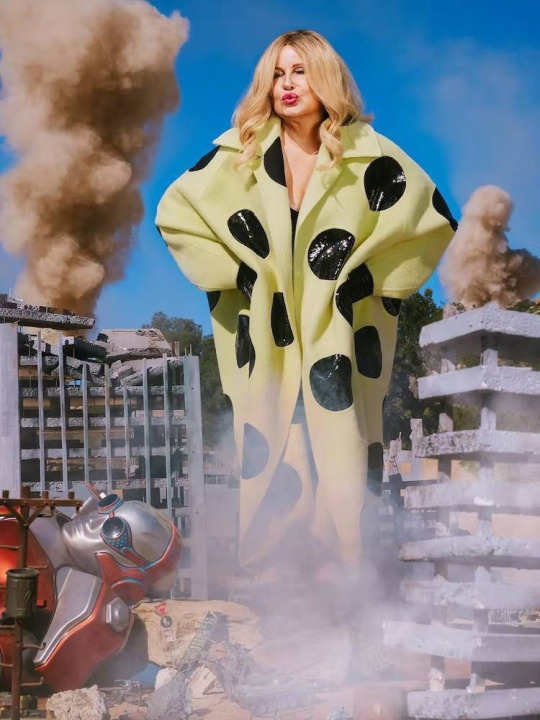
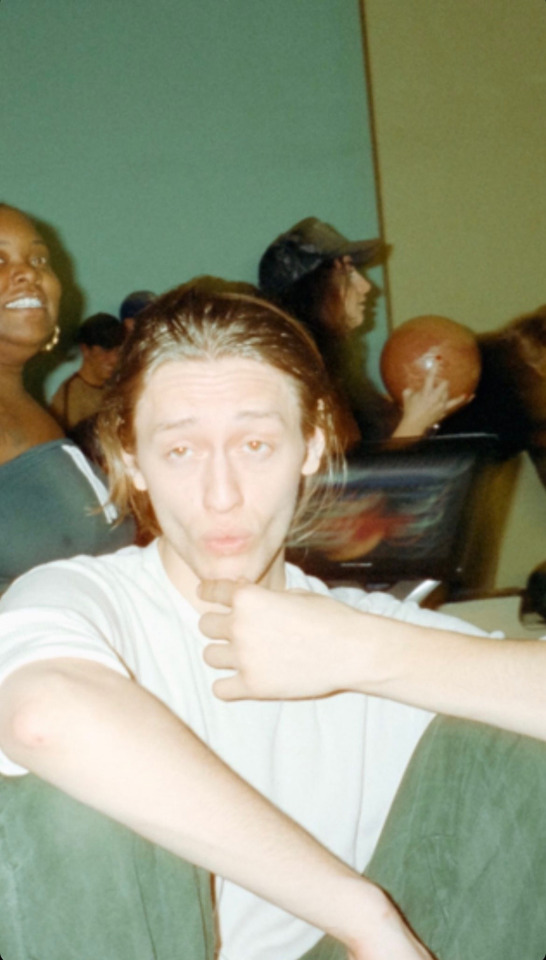
i think a girl can dream lmao...
#percy hynes white#phw#our smol casanova#THAT WOULD BE ICONIC#he already has a film with owen wilson so now i need one with this queen
35 notes
·
View notes
Text
Loki has worn many hats since his initial appearance in the Marvel Cinematic Universe in 2011.
In the first “Avengers” movie, the God of Mischief, played by Tom Hiddleston, descended on New York City with an alien army. In “Thor: Ragnarok,” he teamed up with his brother to protect the people of Asgard, morphing from villain to antihero. And now, in the second season of the “Loki” television series, which premieres Thursday on Disney+, he embarks on a new and unlikely mission — saving the Time Variance Authority.
Season 2 of “Loki” takes place in the aftermath of the mayhem from the first installment, in which Loki and Sylvie (Sophia Di Martino), a free-spirited Loki variant, arrived at the end of history. There, they discovered He Who Remains (Jonathan Majors), the time-bending scientist who masterminded the T.V.A. to prevent another war between the many variants of himself.
When Sylvie stabs He Who Remains, she plunges the T.V.A. and the Sacred Timeline into chaos, unleashing the multiverse. As Season 2 commences, new worlds branch from the timeline, T.V.A. forces splinter into factions and Loki grapples with a problem called time-slipping as he is caught in a tug of war between past and present.
To preserve the T.V.A., Loki reunites with familiar characters — including the wry Mobius (Owen Wilson) and Hunter B-15 (Wunmi Mosaku) — as well as new ones, such as O.B., a T.V.A. fix-it man played by the Oscar-winning actor Ke Huy Quan, and Victor Timely, a 19th-century inventor and Kang variant played by Majors. (Majors is facing charges related to a misdemeanor assault case after being arrested in March in New York. Filming for Season 2 of “Loki” had already finished before the arrest.)
With the original director Kate Herron leaving the project, Justin Benson and Aaron Moorhead, who helped direct “Moon Knight,” became the new lead directors on a majority of the episodes. Eric Martin, who helped write some of the first season’s episodes, has become head writer.
In a video call from his writing studio in Los Angeles, Martin spoke about crafting the plot and characters of Season 2 and working with Quan in his new role.
ImageKe Huy Quan as O.B., Wunmi Mosaku as Hunter B-15, Tom Hiddleston as Loki and Owen Wilson as Mobius.Credit...Marvel/Disney+
What were some of the themes you had in mind as you wrote the script for this show?
I think the most important thing to me is just character and emotionality. I wanted to have everything driven by the wants and needs of our characters and really just focus on their emotional journeys first and foremost. That is the basis for all the drama: Who are our people? Where are their heads at? What do they need? Those are the dramatic questions that drive everything.
As for themes, we still have the ideas of free will and destiny that continue on from Season 1. But for new things, I think order versus chaos is a continual theme. And then a power vacuum. What happens in a power vacuum? I think like the overarching concept of Season 2 is, “You break it, you buy it.” That’s what happened at the end of Season 1. They broke the system. And so now they own this nebulous thing, and it needs to reform and become something new.
How do you see Loki evolving as a character through the first season and into the second?
Season 1, and like Episode 1 especially, scrambled his brains. He sees his own death by the end of that. He realizes that even the infinity stones are pointless at this new level of things. And so he had to completely reset and figure out who he was. And so I think Season 1 we see him make this hero turn although he is still an antihero or villain. But I think Loki had kind of forgotten who he was, and Season 2 is like rebalancing that. So we still have this hero Loki, but we’re getting back to the meat and potatoes of who this guy is. We’re getting back to the God of Mischief. So we see him using all those talents of the God of Mischief but as a hero now.
All these characters are so intertwined across multiple different movies and TV shows in the MCU. So, I’m curious, how much creative freedom do you have in writing for this particular show?
We’re fortunate that we really have our own little sandbox here where we’re able to be really creative and branch off into other directions without stepping on other projects. And some of that’s by design, while some of that is just what we found along the way. In terms of actual marching orders, there have been certain points where it’s like, “Oh, you know what, this character is being used by another project,” and you just have to pivot. But in terms of our drama and our story and where we’re taking our characters, it really is just following them and their needs and proving them on the page. And if we can prove that then nobody steps in and says you need to do something different.
The interactions between Loki and Mobius and between Loki and Sylvie were captivating in Season 1. What should we expect from those interactions in Season 2?
Let me start with Loki and Mobius. They’re a lot of fun to write because they’re an odd couple. They are very different in how they do everything. They are on the same side. They’re on the same page, but they’re reading different books. They do not have the same path to getting the same thing done, and that’s what’s fun. You have that friction to play with, but they are on the same side. So scene to scene, there’s so much fun to have with them.
And with Loki and Sylvie, they’re a little bit of friends, couple, I’m not sure how you even want to look at them. These are two people that have had this intense experience together, and they split apart and went separate ways. Inevitably they’re going to come together, but how have they each changed? Where have they each gone? And are they going to be able to mesh again?
ImageTom Hiddleston as Loki, Ke Huy Quan as O.B. and Owen Wilson as Mobius.Credit...Marvel/Disney+
So O.B. is definitely an important character in Season 2. What was it like to create this character?
O.B. was born out of a desire to see the rest of the T.V.A. I feel like Season 1 we existed on a couple different levels, but this is a massive place. Like, what else is there? Who else is there? And as I was getting into the first episode of Season 2, I really started to think about who’s the person who is down there in the engine room of the ship. He’s the one who is looking over everything. He’s the fix-it guy. I just started to imagine a guy who was so busy running the machinery that he just doesn’t see anybody. But he loves his job. It very much is like the seven dwarfs and Snow White. They’re just whistling while they work because they love it.
And so Loki and Mobius show up there, and they’re like the first visitors O.B. has had in years. O.B. is just happily doing his job. It really crystallized in my head who that person was — somebody who loved his job. That conception of the character stuck and stayed. And when Ke came on, he just added a layer of sweet humanity to it that I thought brought a whole different level to what O.B. is.
How was Ke brought on for this role?
That was Kevin Feige. He saw him in “Everything Everywhere All at Once” and Kevin fell in love with O.B. on the page, and I think he just saw him and then he’s like, “This is our O.B. He’ll just step right in and be perfect for this.” The first day Ke came, he hadn’t started yet. He just wanted to visit the set and say hi. That’s who Ke is, he wants to know everybody. And we got to talking and had lunch together and it was just this nice lunch talking about his character and getting to hear him dig in and get under the skin of that character and how he was going to approach it. And all just over some cold Chinese noodles.
32 notes
·
View notes
Note
I'm the anon who asked for Owen Wilson film recs—thanks so much to you and all the anons who gave recommendations!! It took a while to find time to sit down for a film, but I watched the trailers for just about every recommendation in the meantime and ended up being won over by Bottle Rocket. Which I have now watched and rather adored. And based just on the performance, not knowing anything about the behind the scenes aside from that Owen and Wes Anderson wrote the script together, I feel no confusion over Wes responding with 'guess I've gotta make this guy my muse for the next decade or so'. I mean yes I couldn't adore him more as Mobius, but watching him in a completely different role does really help drive home that huh. yup. this guy sure can act
I mean I thought all the performances were great, but I'd be lying if I said my eyes weren't glued to Dignan every time he was on screen. An absolutely captivating performance and character. That silly little guy broke my heart in two. Just wants to be part of a team and has bright eyes and a warm heart and not a shred of emotional competence. Everyone likes him and there are a few who love him and he tears apart their lives or his every time he draws them into his orbit. And he made me SAD and I LOVE him.
Omg hi again anon, absolutely love that you've already found some time to journey into his filmography and you couldn't have chosen a better character to start with 🥰
In what seems like a running theme with Owen I'd say Bottle Rocket is probably the most underrated Wes movie (which I'll never understand because it's incredible!!) and would be my own top favorite if The Darjeeling Limited weren't so dear to me but even then it's a close call! So cool to hear your thoughts on Dignan mirror mine exactly, he's one of a kind and just utterly heartbreaking in the most amazing way that somehow you still want, almost need more of even though you know how the story will end every single time?? Which speaks to how the others can't help but keep coming back because I found myself thinking I'd do the same, lol.
Not to mention since it's Owen's first movie there really couldn't be a better contrast to Mobius because what I love about roles of his where he's clearly been involved from a writing perspective too is how his range shines?? For example there's so much of his own personal sense of humor in Dignan that's been carried through the rest of his films and is present in Mobius too, not to mention how they both radiate such bright, genuine energy every time they enter a room but then all other ways they carry themselves and interact right down to each various microexpression are naturally different and equally fascinating.
Thanks so much for the ask and for letting me know what you chose, really hope this is a sign you'll find even more characters of his to love waiting in your future!! 😍💕
#truly while mobius is my fav always the second spot varies and dignan occupies it way more often than not he's WONDERFUL and tragic#i just have too many Thoughts and Feelings™ about every character owen's ever played which sounds impossible... and yet 😅#there isn't anyone who's done it like him or ever will again he's a actual revelation <333#tysm again for the ask!! everything you wrote brings me right back and you really do have even more amazing experiences ahead#love of love and hope your weekend's been great 💖#ask
4 notes
·
View notes
Text
🎃Redacted Couples Dressing Up For Halloween🎃
👻👻Spoopy Time Headcanons👻👻
🥰Couples Costumes🥰🥰
Pt. 1
(Btw, the gender of the costume character is not directly linked to the gender of the redacted character/listener character, Milo and Sweetheart’s is prime example of this)
First up is...
Asher and Baaabe
Ah, yes, the lovely goofball/hot bitch power couple ☺️☺️
These two are the reason I made this list, because I KNOW
Asher would dress as Roger Rabbit
And Babe would dress as Jessica Rabbit
(Who Framed Roger Rabbit 1988 film)
THEY CANT NOT DRESS AS THEM, SERIOUSLY
I also just kinda wanna see Babe in that red dress, ngl-
You just can’t tell me this isn’t them 👇👇👇
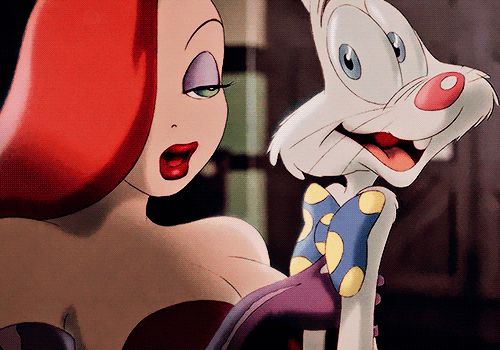
NEXT!
Milo and Sweetheart
Okay, DONT HATE ME FOR THIS
I’m not making fun of Milo’s accent, I swear-
That being said...
Milo would dress as Harley Quinn
And Sweetheart would dress as The Joker
(The DC Universe comic book series and more)
If you disagree, that’s fine, I get it, it’s probably an overdone joke idk,
BUT MILO WOULD BE KILLING IT IN HARLEY QUINN’S SUICIDE SQUAD OUTFIT, ARE YOU KIDDING ME???
And Sweetheart in a suit 👀👀👀👀
I don’t think more needs to be said
Milo calling Sweetheart Puddin
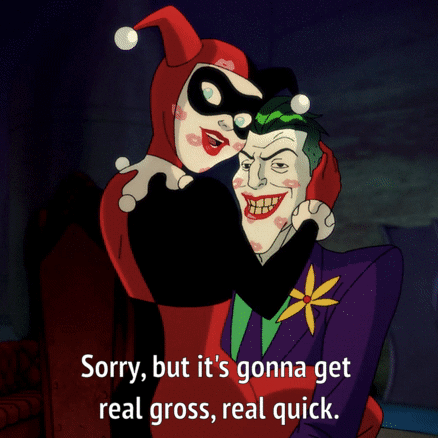
NEXT!
David and Angel
I wish I could think of something more interesting or elaborate for these two, but let’s be honest...
David would dress as The Big Bad Wolf
And Angel would dress as Little Red Riding Hood
(Little Red Riding Hood 17th century folktale)
ITS SO PERFECT THEY LITERALLY CANT BE ANYTHING ELSE
Okay, well, that’s a lie, I almost made them Beauty and the Beast
But I have a feeling David would not want to dress up, so Angel just has to work with what he already is-
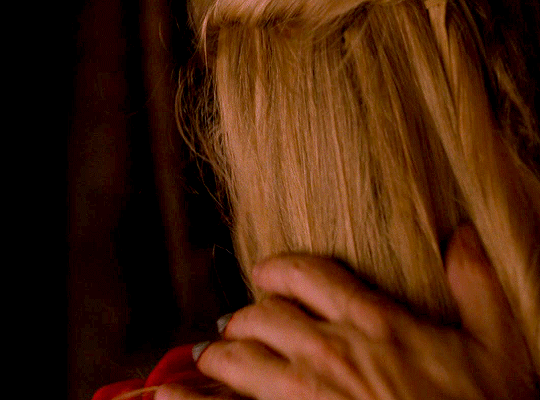
NEXT!
Sam and Darlin
THIS ONES MY FAVORITE THIS ONES MY FAVORITE
Now, I’m not making fun of Sam and calling him a cowboy.
I have his accent too, it’d make me a hypocrite.
HOWEVER THIS IS TOO PERFECT AND IF I CAN MAKE THIS COUPLE CANON IN ANY WAY IT SHALL BE THIS
Sam would dress as Jedediah
And Darlin would dress as Octavius
(Night at the Museum film franchise)
JEDTAVIUS MY BELOVED 😩😩😩
Darlin rocking that Roman armor 👀👀👀👀👀👀👀👀👀
Sammy in the cowboy fit 👀👀👀👀👀👀👀
I know he wouldn’t want to dress as a cowboy, but I think he’d be fine if he’s dressing as Jedediah
We all know he’s an Owen Wilson kinnie anyway
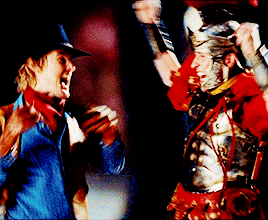
NEXT!
Vincent and Lovely
Okay this one might be a bit of a stretch...
I really struggled to pick a dynamic duo for them, but I think this works
Vincent would dress as Erik “The Phantom”
And Lovely would dress as Christine
(The Phantom of the Opera 1986 musical)
No, I didn’t choose this because I think Vincent would look hot in The Phantom’s mask 😅😅😅
...👀
I honestly don’t have much else to say about them, it just felt right.
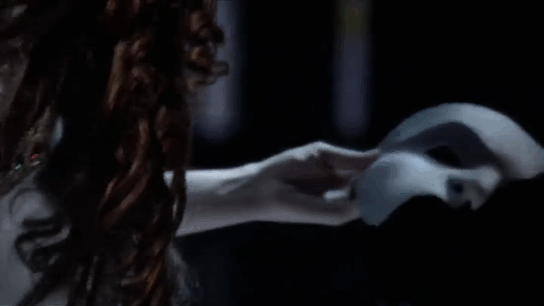
NEXT!
Geordi and Cutie
This is another one that I struggled with
And I honestly don’t know why I think they’d dress as this duo-
Geordi would dress as Jerry
And Cutie would dress as Tom
(Tom and Jerry animated franchise)
To be completely honest, I think they’d dress as any dynamic duo within Looney Toons/Warner Bros...
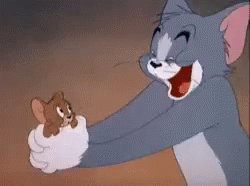
NEXT!
Gavin and Freelancer
Y’know how I said Sam and Darlin’s costume was my favorite?
Well this one is a very close second
Gavin would dress as Tiffany
And Freelancer would dress as Chucky
(Bride of Chucky 1998 film)
I JUST KNOW THAT GAVIN WOULD
HE’S A HOT BITCH AND SO IS TIFF, IT JUST MAKES SENSE
God I hope someone draws this, ngl
Do I just want to see him in a leather jacket and fishnets? Maybe.
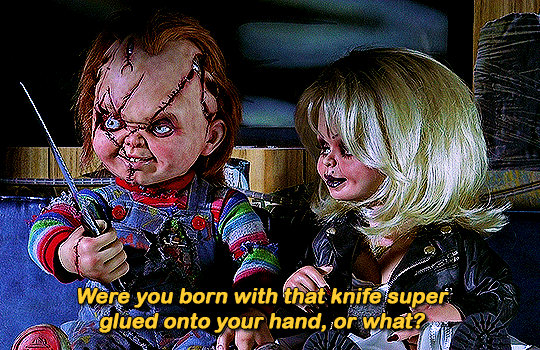
NEXT!
Ollie and Mentor
This one was another struggle
I just don’t know much about either of them even though I’ve listened to Ollie’s playlist
Hell, Mentor doesn’t even have a proper pet name...
But, regardless, there was one iconic duo that came to mind for these two and it just kinda stuck...
Ollie would dress as Shaggy
And Mentor would dress as Velma
(Scooby-Doo animated franchise)
I don’t know why, I just feels like they would
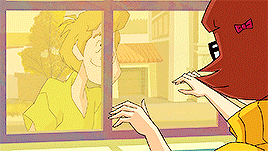
(This is a really cute gif omg)
NEXT!
Elliott and Sunshine
Okay, hear me out-
These two DO NOT PLAY when it comes to Halloween costumes, alright?
They’ve been doing matching outfits for YEARS, even before they were dating
And they will not stop.
Elliott would dress as Wybie
And Sunshine would dress as Coraline
(Coraline 2009 film)
Again, I just feel like they would, okay?
The bestest, mostest, dynamicist, duoist duo in the entire Redactedsphere
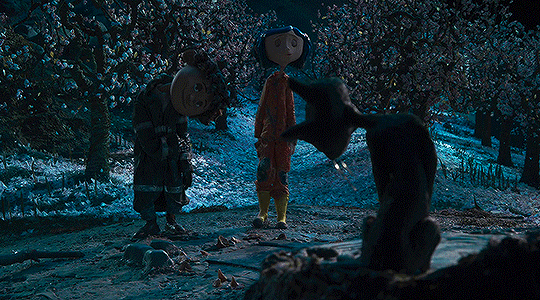
NEXT!
Avior and Starlight
THEY CANT NOT DRESS AS A TIM BURTON COUPLE OKAY-
It’s just perfect for them 😭😭
That being said...
Avior would dress as Jack
And Starlight would dress as Sally
(The Nightmare Before Christmas 1993 film)
I might just want to see Avior in a black and white striped suit, but I swear there’s more to this-
Halloweentown is basically hell.
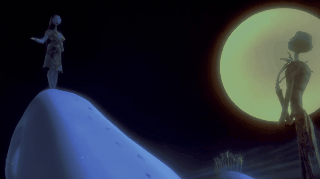
Here's part two!
#redacted asmr#redactedverse#redacted audio#redacted headcanons#redacted Asher#redacted babe#redacted Milo#milo greer#redacted Sweetheart#redacted David#David Shaw#redacted Angel#redacted Sam#Sam Collins#redacted darlin#redacted tank#redacted vincent#vincent solaire#redacted lovely#redacted Geordi#redacted cutie#redacted Gavin#redacted freelancer#redacted Ollie#redacted Mentor#redacted elliott#redacted sunshine#redacted avior#redacted starlight#redacted Halloween
136 notes
·
View notes
Text
natm 4 thoughts/reaction
late to the game but you already know [major spoilers ahead]
i love how feral they allowed every character to get in this movie (ESPECIALLY sacajawea), them working together to gaslight gatekeep girlboss the night guards into leaving was (chef's kiss)
also love how this canon basically completely ignores the (terrible) ending of natm 3, love that larry's still involved with the museum, amazing, perfect, no notes
unpopular opinion, i love that nicky's a lil dweeb full of anxiety now. that feels more like the natural progression of his character than becoming a kind of jerk-y frat bro. OG!nicky doesn't make his own mixes and pre-records his sets, NATM4!nicky is a music nerd, loves vaporwave, and accidentally reinvents electro-swing. slay king
[sees the bisexual flag on nicky's notebook] [sonic voice] woah he's bisexual! i didn't know that!
larry is like. such a good dad here. good for him, he's much more supportive than he would've been in the originals. OG!larry probably would've insisted on shadowing him the first night and stood like two feet away making comments about how nicky should be doing things the whole night lmao i love him but this is true
I'M SO GLAD THAT THE EXHIBITS BRING UP THAT NICKY IS LIKE FAMILY AND WAS PRACTICALLY RAISED IN THE MUSEUM cause in the 3rd film nicky just. doesn't seem to care about them that much that boy just wants to LEAVE
i love joan i don't even care that much that she was shoehorned in, she's a lil unhinged and a badass and FINALLY wea has another female friend
BUT WHY DOES SHE LOOK LIKE TAYLOR SWIFT SKREEEEE
laa die challenge. should've been eaten by the crocodile.
it would've been so cool and amazing to explore the basement and the archives and the idea that it's the "deep ocean", dark, fucked-up part of the museum is amazing. but it's also funny that they were just. fucking with nicky jfghfjh
"KAMENRAH THE DISAPPOINTING SON" KDJFGHDKFHJGLKGDFHB
kamenrah thinking nicky was larry giving big "rose quartz steven universe" vibes but also would've been funnier if he then proceeded to call him "nicky daley from daley devices" as a callback to natm 2
i feel like it diminishes the impact of not ahk not seeing his parents for 60+ years that sentient images of his dad, merenhakre are just. everywhere.
speaking of which, i don't even need to say it. everyone's already said it. ahk should've been in this movie and we all know it, but also he wasn't even acknowledged and no one bring him up?? not even kamenrah?? this makes me feel like there's a copyright or licensing issue going on here or SOMETHING cause damn
seth die challenge. stupid little jackal man
the epic highs (using the tablet like a musical instruments to unlock a tomb and playing the squares like chords) and lows (TIME TRAVEL WE'RE REALLY DOING THIS NOW HUH) of the tablet's canonical magic
hnnnnnnn i really dislike the time travel
i think my biggest problem with natm 4 is that the best part of the original movies was getting to explore the museums and meet all the fun new historical characters and the adventures were constrained by the environment therefore THEY SHOULD'VE STAYED AT THE MET
although it is SUPREMELY funny that not only do the met egyptian mummies know of kamenrah, they just decide to fuck off from the narrative cause they just don't want to deal with him JFKDHG
everyone is complaining about teddy's characterization idk man i actually thought that his main bit was pretty funny. of course he just talks about himself, he's mr. the museum
didn't love jed though maybe it was the new VA trying to sound like owen wilson, maybe he felt dumbed down, but the jedtavius moments were very good like everyone said they were
you ever see a couple so married and so divorced at the same time, i love them
overall i'm not mad with the new designs, i think they capture the energy of the original and cartoonify them well — the fight scenes were animated well too, i love that it was 2D and it was charming without FEELING explicitly low budget
yeah yeah i feel similarly that i didn't love the rehash of natm 2, the door, the summoning the minions of the underworld, etc — if it were up to me the movie's main conflict should've been kamenrah versus all the OTHER egyptian pharaohs and mummies at the met vying for power
BUT!!! IT ENDED WITH A DANCE PARTY!!! THAT'S ALL I CARE ABOUT THAT'S WHAT I WAS HOPING FOR AND IT HAPPENED!!!!!!
overall it was cute and fun and i hope it converts into a tv series and also tumblr is way too mad about it for what it is. 6/10
#this is 90% just to get this out of my head if you've read this far that's on you#natm#natm 4#night at the museum#night at the museum kamenrah rises again#personal
17 notes
·
View notes
Link
SPOILER WARNING: Do not read if you haven’t seen all of Season 1 of “Loki,” currently streaming on Disney Plus.
Ever since “Loki” first premiered in June, Kate Herron, who directed all six episodes of the Marvel Studios series, has had to pretend like she knew far less than she really does. For one, she couldn’t acknowledge that the homages to sci-fi classics like “Blade Runner” and “Brazil” that she’d baked into the elaborate sets for the Time Variance Authority — the cosmic bureaucracy tasked with maintaining the sacred timeline — were “meant to be sinister” rather than just “playful and quirky.”
For another, Herron was delighted to see fans theorizing after the very first episode that Kang the Conqueror — a character already set to appear in the Marvel Studios feature “Ant-Man and the Wasp: Quantumania,” as played by Jonathan Majors — was really pulling the strings of the TVA. But until the finale streamed last Wednesday, she couldn’t even hint that those fans were only half right: Majors does play the mastermind of the TVA, but he’s a variant of Kang referred to as He Who Remains. It’s only after He Who Remains encounters Loki (Tom Hiddleston) and his female variant counterpart Sylvie (Sophia Di Martino), and Sylvie plunges a blade into his heart, that the multiverse is reborn, creating the possibility for Kang the Conqueror to emerge.
Again, though: Herron couldn’t acknowledge any of that, even to those closest to her.
“Nothing has prepared me better for working with Marvel than playing tabletop games with my friends,” she says with a laugh. “It definitely taught me how to have a good poker face. You have to hide your hand — and sometimes lie.”
Now, thankfully, all of that is behind her — as is “Loki” itself. Despite receiving widespread acclaim for her assured, ambitious, and visually sumptuous work directing the show, Herron says she has decided not to return for Season 2 of the series.
“I gave it everything — in my soul, in my heart, everything,” she says. “I feel so proud of the work we’ve done. And yeah, I’ll be enjoying Season 2 as a fan.”
She’s quick to sing the praises of everyone she worked with at Marvel, and she says she’s “sure” she’ll work again with the studio. For now, however, she’s ready to take a holiday, and then turn to a project she’s writing herself “that’s really close to my heart that I really want to make.”
“It’s my own decision, but I just feel like my part with ‘Loki’ is finished now and I’m just excited to see where his story goes,” she says.
Before she parts ways for good, however, Herron spoke with Variety about bringing Jonathan Majors into the Marvel Cinematic Universe, what she thought of the shocking revelation about infinity stones and what she would like to see happen in Season 2.
She always knew “Loki” would introduce Kang and the Multiverse…
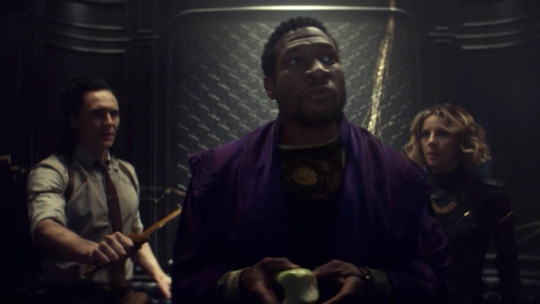
From the very start, Herron says, she and head writer Michael Waldron knew that their six-episode run of “Loki” would always end with Loki and Sylvie meeting He Who Remains at his citadel, the result of which would cause the creation of the multiverse.
As Episode 6 makes clear, both of these events were massive turning points for the future of the MCU — and Herron still can’t quite believe she got to be the one to make them a reality.
“We were just, like, waiting to be told, ‘Actually, guys, we’ve had a change [of heart],'” Herron says. Instead, Herron says she and “Quantumania” director Peyton Reed participated in casting Majors in the role.
“I was just like, pinch me,” she says. “I can’t believe I was at the table for that, because I know it was such a big decision for them all.”
Herron also decided to have Majors provide the voices for all three “Timekeepers” who are supposedly at the head of the TVA, but are revealed by Sylvie to be nothing more than “mindless androids.”
“We didn’t have someone cast for those voices,” she says. “I remember thinking, well, ‘Wizard of Oz’ is clearly a reference for us. We should have the wizard. It’d be great if it’s Jonathan. So we sent him all the art of the timekeepers. And he just kind of came up with these incredible voices for each of them.”
…but not with a cliffhanger.

The most significant decision of the season, though, may be that it ends with a giant cliffhanger, when Loki discovers he’s in a brand new reality for the TVA in which Mobius (Owen Wilson) and Hunter B-15 (Wunmi Mosaku) don’t even recognize him. But while Herron knew how this season of “Loki” would end, at first, she did not know that there would be any more seasons after it.
“When I started, there wasn’t a discussion of Season 2, exactly,” she says. “It was just that season of ‘Loki.’ As we got deeper into production, everyone was very happy, and obviously there’s so much to explore with Loki. It felt like we should continue the story. So I think the cliffhanger ending came in later in the process.”
Herron says she sprinkled in some hints to viewers that Loki is in a new timeline, like redressing sets to look slightly off, and recasting Eugene Cordero’s TVA receptionist Casey as a hunter headed to the armory in a blink-and-you’ll-miss-it moment. But her favorite bit is that the final line — said by Mobius to Loki — is the same as the first line spoken in the show, by a woman in the Gobi desert, also to Loki: “Who are you?”
“That was kind of the question of the whole first season,” Herron says.
She was just as shocked about the Infinity Stones as everyone else.
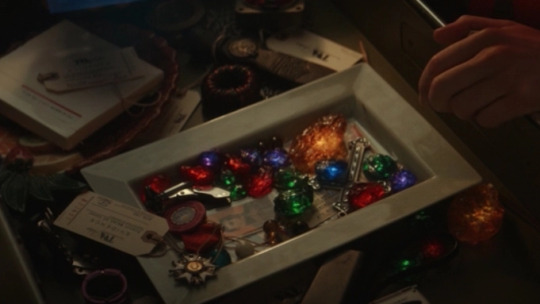
In the first episode, Loki discovers to his horror that not only does his magic not work inside the TVA, but Infinity Stones — heretofore believed to be the most powerful objects in the known universe — are just inert rocks there. The revelation sent shockwaves across the Marvel fandom; Herron was right there with them.
“That was in Michael’s script when I first got it to pitch [for the directing job],” she says. “I remember being like, ‘WHAT?! You put me through so much!’ But then I thought, ‘Oh, it’s kind of genius, because it shows how powerful the TVA are. Who are these people? What is this place?'”
Herron especially appreciated how her shock — and the audience’s — mirrored Loki’s own as the rug gets pulled out from under him. “I was quite excited by it,” she says. “It really shows you that there’s a new power in the MCU — and it’s not what we we spent the last decade dedicating our lives to.”
She told Kevin Feige she wanted gender parity among her crew.

Prior to “Loki,” Herron’s most high profile job was directing the second half of the first season of the Netflix dramedy “Sex Education.” She got the “Loki” job thanks to a 60-page pitch memo that filled out just about every detail of the world of the show. After hiring her, she says Marvel Studios chief Kevin Feige asked her, “What are your terms?”
“This was the first time I was gonna get to hire my heads of department on a television show I worked on,” she says. “I was like, I’d really love [the crew] to be 50/50 across gender.”
Herron says she wasn’t out to fill any jobs on the film with a specific gender. But, she says, “There aren’t enough women in these roles. They’re out there. It’s a lack of opportunity. It’s not a lack of interest.”
She did end up hiring two women for critical roles that are still rarely occupied by women: cinematographer Autumn Durald (“The Sun Is Also a Star”) and composer Natalie Holt (History’s “Knightfall”).
“I felt like she was inside my mind,” Herron says of Durald. “We have the same taste. And I love the way that she talks about light as a character.”
Herron hired Holt unusually early for a composer, after she’d completed editing the first episode during the pandemic shutdown. She knew that the particular sci-fi film noir look of the show that she was developing with Durald needed similarly unique music, and she liked that part of Holt’s pitch was focusing on Loki’s identity as a character.
“Her music then started to inspire how I wanted to shoot other scenes,” Herron says. She’s especially enamored of Holt’s vision for her dynamic and foreboding theme for the TVA.
“She was like, ‘Oh, let’s have that theme be Kang’s’ — well, He Who Remains, I guess, in our show. But I hope that will go on to be Kang’s theme. That was the real fun of it is that you feel like he’s really played a hand now across the whole show, because you realize that music is his music.”
Herron, Durald, and Holt all deliver distinctive and superlative work that’s nothing like the MCU has quite seen before — and nothing quite like anything previously in their careers, either. And that’s entirely the point.
“I think for us, it was about just showing people what we could do and that we could do it at this level,” Herron says.
The episode in which Loki comes out as bisexual was inspired by Alfonso Cuarón and Richard Linklater.

Every episode of “Loki” features multiple extended scenes of two characters just talking to one another, a rarity in a comic book production. Herron says that cutting Episode 1 together during the pandemic lockdown and seeing the scenes between Loki and Mobius (Owen Wilson) play out so well “definitely gave us confidence” to continue that rhythm for the rest of the show.
That was especially true for Episode 3. Written by Bisha K. Ali (who went on to create the upcoming Marvel Studios series “Ms. Marvel”), the episode is essentially an extended meet-cute between Loki and Sylvie as they get to know each other on a planet doomed for total annihilation.
“Bisha’s reference was ‘Before Sunrise’ and ‘Children of Men,'” says Herron. “And it lit my brain on fire. It was kind of weird. It was almost like a bottle episode in the sense that we’re just with the two characters, but obviously, it’s Marvel, right? So they’re bonding in this Apocalypse, which also feels very Loki at the same time.”
That episode is best known for making Marvel Studios history, when Loki casually mentions that he’s had dalliances with both men and women. Herron says that when she first interviewed for the job, she asked if the show was going to acknowledge Loki’s sexuality, which had long been established in the comics as bisexual or pansexual.
“I think everyone wanted to acknowledge it,” she says. “It was just really about giving a care and consideration and doing it in the right way. I think everyone knew it was gonna be quite a big moment. So it was just really about doing it in a way that felt respectful. And honoring it.”
Herron also confirms what many fans had suspected, that she deliberately made the lighting scheme for the scene evoke the blue, purple and red of the bisexual flag. “We knew what we were doing with that scene,” she says with a smile.
She has a lot of ideas for what she’d like to see in Season 2.
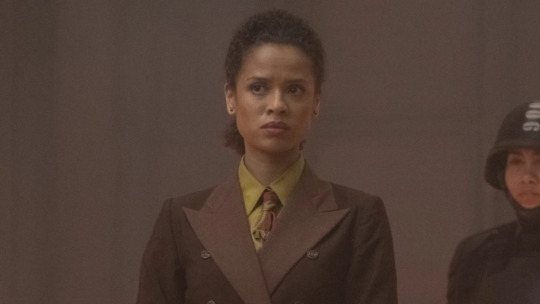
Since Herron will be watching Season 2 of “Loki” only “as a fan,” she is also free to wildly speculate as to what she’d most like to see happen — like how, wherever Loki story leads, “we’ve opened the door” for the character to explore his sexuality with men as well as women.
Otherwise? She says she wants to know where Judge Ravonna Renslayer (Gugu Mbatha-Raw) goes to when she leaves the TVA in search, she tells Mobius, of “free will.”
“I love her,” Herron says. “Gugu used to always call her an indoor girl, which made me laugh, but she is. She’s in the office, but she used to be this kick-ass Hunter. So I’m like, Okay, well, where’s her path going?”
Herron is also keen to learn more about Hunter B-15’s backstory — since she deliberately decided to hide it in the scene in Episode 4 when Sylvie shows B-15 her repressed memories as a variant.
“I was like, we shouldn’t see her memories,” Herron says. “It’s a character that thought they had power and realizes they have no power. It felt really powerful to at least give her some power in that scenario. The memories are private. They’re hers.” She pauses. “Also as a fan, I’m like, ‘Oh my God, who is she?!'”
“And obviously, you know, Loki and Sylvie?” Herron continues, on a roll. “He’s in a completely different reality. What’s going to happen to him? How will he get back? Or will he get back? And where’s Sylvie? She’s still in the Citadel? And the multiverse of it all. What the hell is going to happen?!”
Herron chuckles at her own excitement. “So I think there’s so many questions to be answered, and so much more road to travel with all our characters,” she says. “You know, I’m really proud that I got to set up Loki’s story here. But there’s so many different aspects of his identity and personality that’s yet to be explored. I’m excited to see where it goes.”
41 notes
·
View notes
Text
West Side Story (2021): A Review

The new West Side Story is great if you think the politics of the original film were too subtle. Also if you hated the pristine cinematography of the original and would have preferred it instead to resemble a 12-year-old figuring out how instagram filters work, boy do I got a film for you...
Really, it was okay. No need to ever watch it again, but I've had worse times. The leads could sing. Dancing is somehow even gayer now because it's less homosexual, but whatever, I can't control that.
Hollywood has apparently forgotten the sheer cinematic joy of casting 35-year-olds to play teenagers, as this movie starred actual kids. There’s nothing impressive about that. Actual teens are nimble. When I pay for prancing, I want to see emaciated theater freaks my own age who have sustained a magical simulacra of youth by spending their twenties and thirties consuming nothing but cigarettes and cocaine. Seriously, what does this tell kids to aspire to? If you’re 19 and haven’t already been cast, that’s it, you’re out, you might as well eat food instead of vodka. Bullshit. An absolute betrayal of everything that used to make Broadway enjoyable.
The film evinced some of the worst anti-Irish prejudice I have ever seen,. The primary antagonist, Griff, looks like if Alfred E. Newman was going through chemotherapy, and it’s said he gets his desire from violence from his ol’ paddy of a dad. This is compounded by the film's blatant pro-Polish bias, pretending that a young man of the Polish persuasion would magically be able to open jars and dance and court a young Puerto Rican woman while only resorting to brute force a handful of times. Maybe you can ask an insider to explain this kind of sicko Hollywood bullshit because from where I was sitting it just didn't make no sense.
As to the woke stuff conservatives are complaining about: they stress that Maria is 18, which is pretty fucking atrocious but just what you have to do if you want to make movies now. Only a matter of time before the ruin all the classics: making it so Jane Eyre teams up with Bertha, adding some passages to Moby Dick to make it seem like Ahab wasn’t trying to fuck the whale and/or that if he was that would be very good and valid, etc. Again, we can’t change that. It was neat seeing the Puerto Ricans repeatedly refer to themselves as “brown,” though, as if that designation existed before 2010, and as if they very much did not want to consider themselves white.
Also, before the movie played there were like 9 trailers for the worst-looking pieces of crap I've ever seen, including one in which a guy wearing an Owen Wilson Halloween mask (who turns out to actually be Owen Wilson?!?) marries a CGI Jennifer Lopez when she proposes to him at some kind of reality show taping. They also played a commercial for cryptocurrency and another one for that facebook mind-control device that also looks like absolute shit. The future of American culture is very bleak indeed.
11 notes
·
View notes
Text
Loki takes over: Tom Hiddleston on his new TV series and a decade in the MCU
from Entertainment Weekly
Ten years after Hiddleston first chose chaos in Thor, Marvel’s fan favorite God of Mischief is going even bigger with his time-bending Disney+ show.
By Chancellor Agard May 20, 2021
Tom Hiddleston is Loki, and he is burdened with glorious purpose: After playing Thor's puckish brother for over a decade in the Marvel Cinematic Universe, no one understands the mercurial Asgardian God of Mischief as well as the actor. He can teach an entire seminar on Loki if given the opportunity — which he actually did during pre-production on his forthcoming Disney+ show. In conversation, Hiddleston quotes lines from his MCU debut, 2011's Thor, almost verbatim, and will playfully correct you if you mistakenly refer to Asgard's Rainbow Bridge as the Bifrost, which is the portal that connects Loki and Thor's homeworld to the Nine Realms, including Midgard, a.k.a. Earth. "Well, the Bifrost technically is the energy that runs through the bridge," he says with a smile. "But nine points to Gryffindor!" And when he shows up to the photo shoot for this very digital cover, he hops on a call with our photo editor to pitch ways the concept could be even more Loki, like incorporating the flourish the trickster does whenever magically conjuring something. The lasting impression is that playing Loki isn't just a paycheck.
"Rather than ownership, it's a sense of responsibility I feel to give my best every time and do the best I can because I feel so grateful to be a part of what Marvel Studios has created," the 40-year-old Brit tells EW over Zoom a few days after the shoot and a week out from Thor's 10th anniversary. "I just want to make sure I've honored that responsibility with the best that I can give and the most care and thought and energy."
After appearing in three Thor movies and three Avengers, Hiddleston is bringing that passion to his first solo Marvel project, Loki, the House of Ideas' third Disney+ series following the sitcom pastiche WandaVision and the topical The Falcon and the Winter Soldier. Led by head writer Michael Waldron (Doctor Strange in the Multiverse of Madness, Heels), the six-episode drama sees Hiddleston's shapeshifting agent of chaos step out from behind his brother's shadow and into the spotlight for a timey-wimey, sci-fi adventure that aims to get to the bottom of who Loki really is. "I wanted to explore slightly more complex character questions," says Waldron. "It's not just good versus bad. Is anybody all good? Is anybody all bad? What makes a hero, a hero? A villain, a villain?"
Even though Loki — who loves sowing mayhem with his illusion magic and shapeshifting, all with a major chip on his shoulder — has never been one for introspection, the idea of building an entire show around him was a no-brainer for Marvel. When asked why Loki was one of the studio's first Disney+ shows, Marvel president Kevin Feige replies matter-of-factly, "More Hiddleston, more Loki." First introduced as Thor's (Chris Hemsworth) envious brother in Kenneth Branagh's Thor, Loki went full Big Bad in 2012's The Avengers. That film cemented the impish rogue as one of the shared universe's fan favorites, thanks to Hiddleston's ability to make him deliciously villainous yet charismatic and, most importantly, empathetic. The character's popularity is one of the reasons he's managed to avoid death many times.
"He's been around for thousands of years. He had all sorts of adventures," says Feige. "Wanting to fill in the blanks and see much more of Loki's story [was] the initial desire [for the series]."
The Loki we meet on the show is not the one who fought the Avengers in 2012 and evolved into an antihero in Thor: The Dark World and Thor: Ragnarok before meeting his demise at the hands of the mad titan Thanos (Josh Brolin) in 2018's Avengers: Infinity War. Instead, we'll be following a Loki from a branched timeline (a variant, if you will) after he stole the Tesseract following his thwarted New York invasion and escaped S.H.I.E.L.D. custody during the time heist featured in Avengers: Endgame. In other words, this Loki hasn't gone through any sort of redemption arc. He's still the charming yet petulant god who firmly believes he's destined to rule and has never gotten his due.
Premiering June 9, Loki begins with the Time Variance Authority — a bureaucratic organization tasked with safeguarding the proper flow of time — arresting the Loki Variant seen in Endgame because they want his help fixing all of the timeline problems he caused while on the run with the Tesseract. So there will be time travel, and a lot more of it than in Endgame. As Loki makes his way through his own procedural, he'll match wits with new characters including Owen Wilson's Agent Mobius, a brilliant TVA analyst, and Gugu Mbatha-Raw's Judge Renslayer. The question in early episodes is whether Loki will help them or take over.
"One of the things Kevin Feige led on was, 'I think we should find a way of exploring the parts of Loki that are independent of his relationship with Thor,' or see him in a duality or in relationship with others, which I thought was very exciting," says Hiddleston, who also serves as an executive producer on the show. "So the Odinson saga, that trilogy of films, still has its integrity, and we don't have to reopen it and retell it."
Yet, in order to understand where Loki is going, it's important to see where he came from.
Hiddleston can't believe how long he and Loki have been connected. "I've been playing this character for 11 years," he says. "Which is the first time I have said that sentence, I realize, and it [blows] my mind. I don't know what percentage that is exactly of my 40 years of being alive, but it's substantial."
His time as Loki actually goes a bit further back, to 2009 — a year after Robert Downey Jr. big banged the MCU into existence with Iron Man — when he auditioned for Thor. It's no secret that Hiddleston initially went in for the role of the titular God of Thunder, but Feige and director Kenneth Branagh thought his natural charm and flexibility as an actor made him better suited for the movie's damaged antagonist. "Tom gave you an impression that he could be ready for anything, performance-wise," says Branagh, who had previously worked with him on a West End revival of Checkov's Ivanov and the BBC series Wallander. "Tom has a wild imagination, so does Loki. He's got a mischievous sense of humor and he was ready to play. It felt like he had a star personality, but he was a team player."
Hiddleston fully immersed himself in the character. Outside of studying Loki's history in the Marvel Comics, he also researched how Loki and the Trickster God archetype appeared across mythology and different cultures. "He understood that he was already in something special [and] it was a special character in a special part of that early moment in the life of the Marvel universe where [he] also needed to step up in other ways," says Branagh, who was impressed by the emotional depth Hiddleston brought to the part, especially when it came to how isolated Loki felt in the Asgardian royal family.
There was a lot riding on that first Thor feature. For one, no one knew if audiences would immediately latch onto a Shakespearean superhero movie partially set on an alien planet populated by the Norse Gods of legend. Second, it was integral to Feige's plans for the shared universe. Loki was supposed to be the main villain in The Avengers, which would not only mirror how Earth's mightiest heroes joined forces in 1963's Avengers #1 but also give Thor a believable reason for teaming up with Iron Man, Captain America (Chris Evans), and the rest of the capes. Feige first clued Hiddleston into those larger plans when the actor was in L.A. before Thor started shooting.
"I was like, 'Excuse me?' Because he was already three, four steps ahead," says Hiddleston. "That took me a few minutes to process, because I didn't quite realize how it just suddenly had a scope. And being cast as Loki, I realized, was a very significant moment for me in my life, and was going to remain. The creative journey was going to be so exciting."
Hiddleston relished the opportunity to go full villain in Avengers, like in the scene where Loki ordered a crowd to kneel before him outside a German opera house: "It's the unspoken truth of humanity, that you crave subjugation," says the Machiavellian god. "The bright lure of freedom diminishes your life's joy in a mad scramble for power, for identity. You were made to be ruled. In the end, you will always kneel."
"I just knew that in the structure of that film, I had to lean into his role as a pure antagonist," Hiddleston recalls. "What I always found curious and complex about the way Loki is written in Avengers, is that his status as an antagonist comes from the same well of not belonging and being marginalized and isolated in the first Thor film. Loki now knows he has no place in Asgard."
Loki did find a place within the audience's hearts, though. Feige was "all in" on Hiddleston as his Loki from the beginning, but even he couldn't predict how much fans would love him. Feige recalls the reaction at the 2013 San Diego Comic-Con: "Did we know that after he was the villain in two movies, he would be bringing thousands of people to their feet in Hall H, in costume, chanting his name? No, that was above and beyond the plan that we were hoping for and dreaming of." It was a dream Feige first got an inkling of a year earlier during the Avengers press tour when a Russian fan slipped past security, snuck into Mark Ruffalo's car, and asked the Hulk actor to give Hiddleston a piece of fan art she created. "That was one of the early signs there was much more happening with this quote-unquote villain."
Despite that popularity, the plan was to kill Loki off in 2013's Thor: The Dark World, but the studio reversed course after test audiences refused to believe he actually died fighting the Dark Elves. Alas, he couldn't out-illusion death forever. After returning in Taika Waititi's colorful and idiosyncratic Thor: Ragnarok, Hiddleston's character perished for real in the opening moments of Infinity War. In typical Loki fashion, before Thanos crushed his windpipe, he delivered a defiant speech that indicated he'd finally made peace with the anger he felt toward his family.
"It felt very, very final, and I thought, 'Okay, that's it. This is Loki's final bow and a conclusive end to the Odinson saga,'" says Hiddleston, who shot that well-earned death scene in 2017.
But, though he didn't know it yet, the actor's MCU story was far from over.
When Hiddleston returned to film two scenes in Avengers: Endgame in 2017, he had no idea where Loki portaled off to after snatching the Tesseract. "Where'd he go? When does he go? How does he get there? These are all questions I remember asking on the day, and then not being given any answers," Hiddleston recalls. To be fair, it's likely the Powers That Be didn't necessarily have answers then. While Feige can't exactly recall when the writers' room for Endgame first devised Loki's escape sequence, he does know that setting up a future show wasn't the primary goal — because a Loki series wasn't on the horizon just yet.
"[That scene] was really more of a wrinkle so that one of the missions that the Avengers went on in Endgame could get screwed up and not go well, which is what required Cap and Tony to go further back in time to the '70s," says Feige. Soon after that, though, former Disney CEO Bob Iger approached Feige about producing content for the studio's forthcoming streaming service. "I think the notion that we had left this hanging loose end with Loki gave us the in for what a Loki series could be. So by the time [Endgame] came out, we did know where it was going."
As for Hiddleston, he didn't find out about the plans for a Loki show until spring 2018, a few weeks before Infinity War hit theaters. "I probably should not have been surprised, but I was," says the actor. "But only because Infinity War had felt so final."
Nevertheless, Hiddleston was excited about returning for his show. He was eager to explore Loki's powers, especially the shapeshifting, and what it meant that this disruptive figure still managed to find a seat beside the gods in mythology. "I love this idea [of] Loki's chaotic energy somehow being something we need. Even though, for all sorts of reasons, you don't know whether you can trust him. You don't know whether he's going to betray you. You don't why he's doing what he's doing," says Hiddleston. "If he's shapeshifting so often, does he even know who he is? And is he even interested in understanding who he is? Underneath all those masks, underneath the charm and the wit, which is kind of a defense anyway, does Loki have an authentic self? Is he introspective enough or brave enough to find out? I think all of those ideas are all in the series — ideas about identity, ideas about self-knowledge, self-acceptance, and the difficulty of it."
“The series will explore Loki's powers in a way they have not yet been explored, which is very, very exciting.”
The thing that truly sold Hiddleston on the show was Marvel's decision to include the Time Variance Authority, a move he describes as "the best idea that anybody had pertaining to the series." Feige and Loki executive producer Stephen Broussard had hoped to find a place for the TVA — an organization that debuted in 1986's Thor #372 and has appeared in She-Hulk and Fantastic Four stories — in the MCU for years, but the right opportunity never presented itself until Loki came along. "Putting Loki into his own procedural series became the eureka moment for the show," says Feige.
The TVA's perspective on time and reality also tied into the themes that Waldron, Loki's head writer, was hoping to explore. "Loki is a character that's always reckoning with his own identity, and the TVA, by virtue of what they do, is uniquely suited to hold up a mirror to Loki and make him really confront who he is and who he was supposed to be," says Waldron. Hiddleston adds: "[That] was very exciting because in the other films, there was always something about Loki that was very controlled. He seemed to know exactly what the cards in his hand were and how he was going to play them…. And Loki versus the TVA is Loki out of control immediately, and in an environment in which he's completely behind the pace, out of his comfort zone, destabilized, and acting out."
To truly dig into who Loki is, the creative team had to learn from the man who knows him best: Hiddleston. "I got him to do a thing called Loki School when we first started," says director Kate Herron. "I asked him to basically talk through his 10 years of the MCU — from costumes to stunts, to emotionally how he felt in each movie. It was fantastic."
Hiddleston got something out of the Loki school, too. Owen Wilson both attended the class and interviewed Hiddleston afterward so that he could better understand Loki, as his character Mobius is supposed to be an expert on him. During their conversation, Wilson pointedly asked Hiddleston what he loved about playing the character.
"And I said, 'I think it's because he has so much range,'" says Hiddleston. "I remember saying this to him: 'On the 88 keys on the piano, he can play the twinkly light keys at the top. He can keep it witty and light, and he's the God of Mischief, but he can also go down to the other side and play the heavy keys. And he can play some really profound chords down there, which are about grief and betrayal and loss and heartbreak and jealousy and pride.'" Hiddleston recalls Wilson being moved by the description: "He said, 'I think I might say that in the show.' And it was such a brilliant insight for me into how open Owen is as an artist and a performer.'"
Everyone involved is particularly excited for audiences to see Hiddleston and Wilson's on-screen chemistry. "Mobius is not unlike Owen Wilson in that he's sort of nonplussed by the MCU," says Feige. "[Loki] is used to getting a reaction out of people, whether it's his brother or his father, or the other Avengers. He likes to be very flamboyant and theatrical. Mobius doesn't give him the reaction he's looking for. That leads to a very unique relationship that Loki's not used to."
As for the rest of the series, we know that Loki will be jumping around time and reality, but the creative team isn't keen on revealing when and where. "Every episode, we tried to take inspiration from different things," says Waldron, citing Blade Runner's noir aesthetic as one example.
"Part of the fun of the multiverse and playing with time is seeing other versions of characters, and other versions of the titular character in particular," says Feige, who also declined to confirm if Loki ties into Doctor Strange in the Multiverse of Madness and/or other upcoming projects.
Making Loki was especially meaningful to Hiddleston because they shot most of it during the pandemic, in late 2020. "It will remain one of the absolute most intense, most rewarding experiences of my life," he says. "It's a series about time, and the value of time, and what time is worth, and I suppose what the experience of being alive is worth. And I don't quite know yet, and maybe I don't have perspective on it, if all the thinking and the reflecting that we did during the lockdown ended up in the series. But in some way, it must have because everything we make is a snapshot of where we were in our lives at that time."
While it remains to be seen what the future holds for Loki beyond this initial season, Hiddleston isn't preparing to put the character to bed yet. "I'm open to everything," he says. "I have said goodbye to the character. I've said hello to the character. I said goodbye to the character [again]. I've learned not to make assumptions, I suppose. I'm just grateful that I'm still here, and there are still new roads to explore."
Additional reporting by Jessica Derschowitz
26 notes
·
View notes
Text
round up // JULY 21
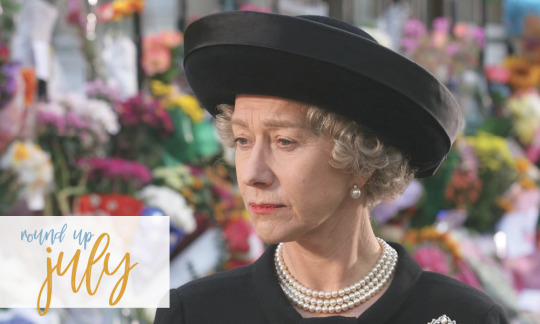
‘Tis the season to beat the heat at the always-cold theatres and next to fans set at turbo speed. While my movie watching slowed a bit with the launch of the Summer Olympics on July 23rd, I’ve still got plenty of popcorn-ready and artsy recommendations for you. A few themes in the new-to-me pop culture I’m recommending this month:
Casts oozing with embarrassing levels of talent (sometimes overqualified for the movies they’re in)
Pop culture that is responding or reinterpreting past pop culture
Stories that get weEeEeird
Keep on-a-scrollin’ to see which is which!
July Crowd-Pleasers
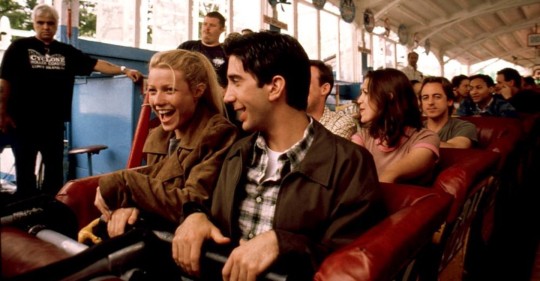
1. Double Feature – ‘90s Rom-Coms feat. Lots of Lies: Mystery Date (1991) + The Pallbearer (1996)
In Mystery Date (Crowd: 7.5/10 // Critic: 6/10), Ethan Hawke and Teri Polo get set up on a blind date that gets so bizarre and crime-y I’m not sure how this didn’t come out in the ‘80s. In The Pallbearer (Crowd: 8/10 // Critic: 7/10), David Schwimmer and Gwyneth Paltrow try to combine The Graduate with Four Weddings and a Funeral in a story about lost twentysomethings. If you don’t like rom-coms in which circumstances depend on lots of lies and misunderstandings, these won’t be your jam, but if you’re like me and don’t mind these somewhat-cliché devices, you’ll be hooked by likeable casts and plenty of rom and com.
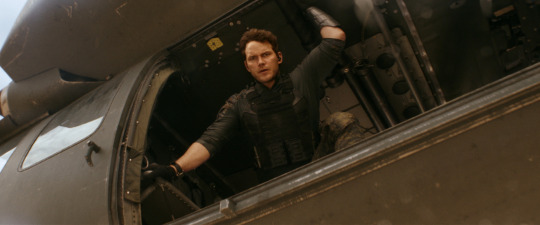
2. The Tomorrow War (2021)
I thought of no fewer movies than this list while watching: Alien, Aliens, Angel Has Fallen, Cloverfield, Interstellar, Kong: Skull Island, Prometheus, A Quiet Place: Part II, Star Wars: The Empire Strikes Back, Star Wars: The Revenge of the Sith, The Silence of the Lambs, The Terminator, Terminator 2: Judgment Day, and World War Z. And you know what? I like all those movies! (Okay, maybe I just have a healthy respect/fear of The Silence of the Lambs.) The Tomorrow War may not be original, but it borrows some of the best tropes and beats from the sci-fi and action genres, so much so I wish I could’ve seen Chris Pratt and Co. fight those gross monsters on a big screen. Crowd: 9/10 // Critic: 6/10
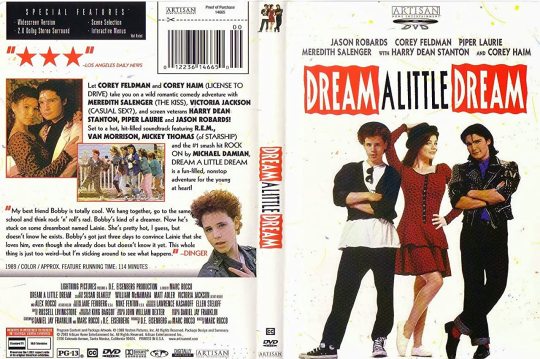
3. Dream a Little Dream (1989)
My July pick for the Dumb Rom-Com I Nevertheless Enjoyed! I CANNOT explain the mechanics of this body switch comedy to you—nor can the back of the DVD case above—but, boy, what an ‘80s MOOD. I did not know I needed to see a choreographed dance routine starring Jason Robards and Corey Feldman, but I DID. All I know is some movies are made for me and that I’m now a card-carrying member of the Two Coreys fan club. Crowd: 8/10 // Critic: 6.5/10
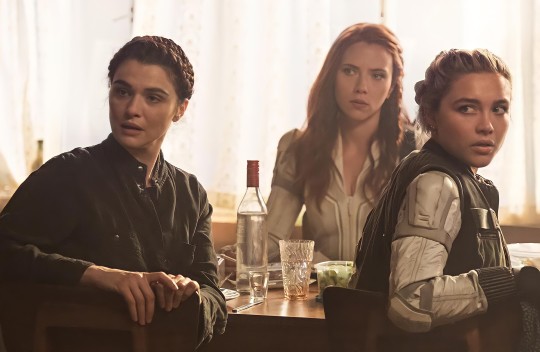
4. Black Widow (2021)
The braids! The Pugh! Black Widow worked for me both as an exciting action adventure and as a respite from the Marvel adventures dependent on a long memory of the franchise. (Well, mostly—keep reading for a second MCU rec much more dependent on the gobs of previous releases.) Crowd: 9/10 // Critic: 7.5/10
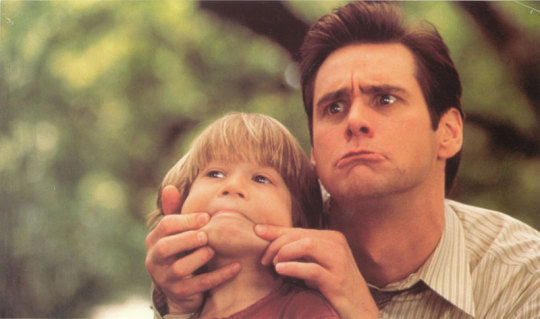
5. Liar Liar (1997)
Guys, Jim Carrey is hilarious. That’s it—that’s the review. Crowd: 9/10 // Critic: 7/10
youtube
6. Sob Rock by John Mayer (2021)
It’s very possible I’ve already listened to this record more than all other John Mayer records. It doesn’t surpass the capital-G Greatness of Continuum, but it’s a little bit of old school Mayer, a little bit ‘80s soft rock/pop, and I’ve had it on repeat most of the two weeks since it’s been out. Featuring the boppiest bop that ever bopped, at least one lyrical gem in every track, and an ad campaign focused on Walkmans, this record skirts the line between Crowd faves and Critic-worthy musicianship.
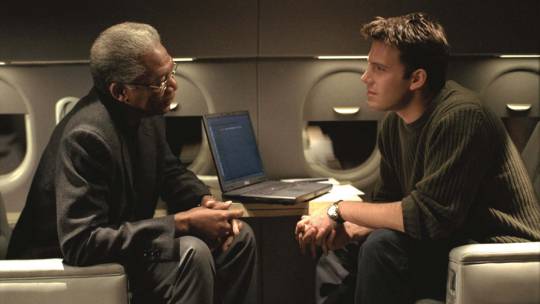
7. Double Feature – ‘00s Ben Affleck Political Thrillers: The Sum of All Fears (2002) + State of Play (2009)
In The Sum of All Fears (Crowd: 8.5/10 // Critic: 7.5/10), Ben Affleck is Jack Ryan caught up in yet another international incident. In State of Play (Crowd: 8/10 // Critic: 7/10), he’s a hotshot Congressman caught up in a scandal. Both are full of plot twists and unexpected turns, and in both, Affleck is accompanied by actors you’re always happy to see, like Jason Bateman, James Cromwell, Russell Crowe, Jeff Daniels, Viola Davis, Morgan Freeman, Philip Baker Hall, David Harbour, Rachel McAdams, Helen Mirren, Liev Schreiber, and Robin Wright—yes, I swear all of those people are in just those two movies.
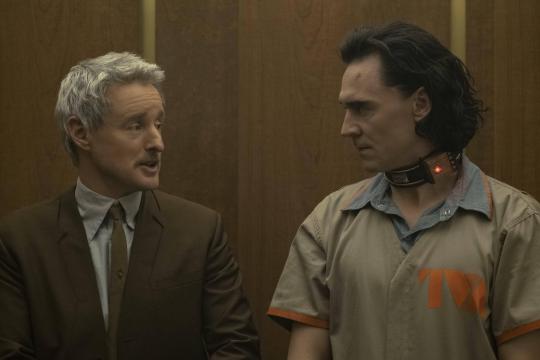
8. Loki (2021-)
Unlike Black Widow, you can’t go into Loki with no MCU experience. The show finds clever ways to nudge us with reminders (and did better at it than Falcon and the Winter Soldier), but be forewarned that at some point, you’re just going to have to let go and accept wherever this timeline-hopper is taking you. An ever-charismatic cast keeps us grounded (Owen Wilson, Jonathan Majors, and an alligator almost steal the show from Tom Hiddleston in some eps), but while Falcon lasted an episode or two too long, Loki could’ve used a few more to flesh out its complicated plot and develop its characters. Thankfully, the jokes matter almost as much as the sci-fi, so you can still have fun even if you have no idea what’s going on.
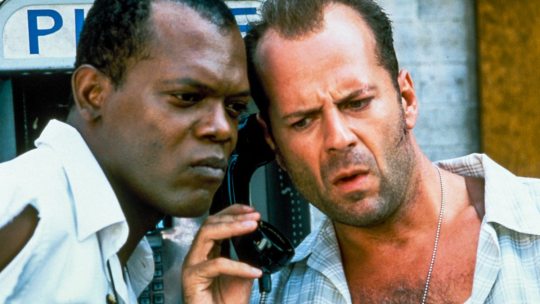
9. Double Feature – Bruce Willis: Die Hard With a Vengeance (1995) + The Whole Nine Yards (2000)
Before Bruce Willis began starring in many random direct-to-DVD movies I only ever hear about in my Redbox emails, he was a Movie Star smirking his way up the box office charts. In the third Die Hard (Crowd: 10/10 // Critic: 7.5/10), he teams up with Samuel L. Jackson to decipher the riddles of a terrorist madman (Jeremy Irons), and it’s a thrill ride. In The Whole Nine Yards (Crowd: 9/10 // Critic: 8/10), he’s hitman that screws up dentist Matthew Perry’s boring life in Canada, and—aside from one frustrating scene of let’s-objectify-women-style nudity—it’s hilarious.
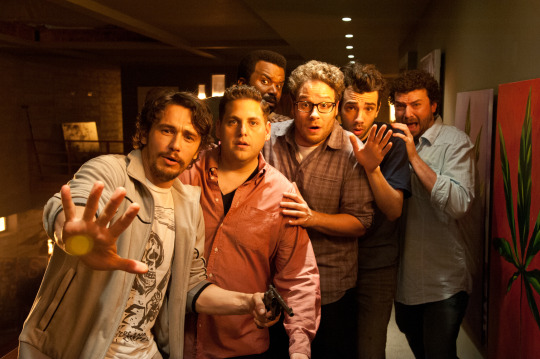
10. This Is the End (2013)
On paper, this is not a movie for me. An irreverent stoner comedy about a bunch of bros partying it up before the end of the world? None of things are for Taylors. But with a little help of a TV edit to pare down the raunchy and crude bits, I laughed my way through and spent the next several days thinking through its exploration of what makes a good person. While little of the plot is accurate to Christian Gospel and theology, some of its big ideas are consistent enough with the themes of the book of Revelation I found myself thinking about it again in church this morning. (Would love to know if Seth Rogen ever expected that.) Plus, I love a good self-aware celebrity spoof—can’t tell you how many times I’ve just laughed remembering the line, “It’s me, Jonah Hill, from Moneyball”—and an homage to horror classics. Crowd: 8/10 // Critic: 7/10
July Critic Picks
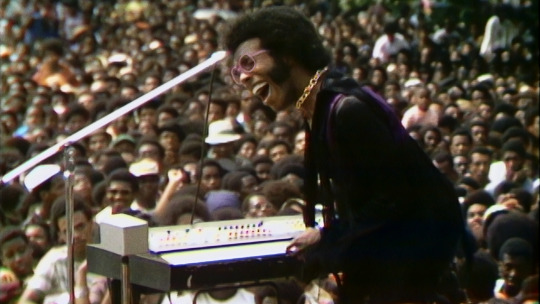
1. Summer of Soul (…or, When the Television Could Not Be Televised) (2021)
Even director Questlove didn’t know about the Harlem Cultural Festival, but now he’s compiled the footage so we can all enjoy one of the coolest music fest lineups ever, including The 5th Dimension, B.B. King, Gladys Knight and the Pips, Nina Simone, Sly and the Family Stone, and Stevie Wonder, who made my friend’s baby dance more than once in the womb. See it on the big screen for top-notch audio. Crowd: 8/10 // Critic: 9/10
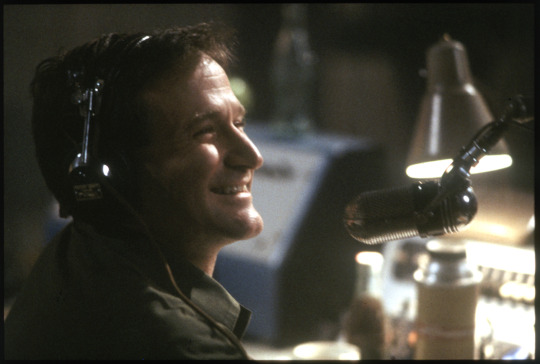
2. Good Morning, Vietnam (1987)
Robin Williams takes on the bureaucracy, disillusionment, and malaise of the Vietnam War with comedy. Williams was a one-of-a-kind talent, and here it’s on display at a level on par with Aladdin. Crowd: 8/10 // Critic: 9/10
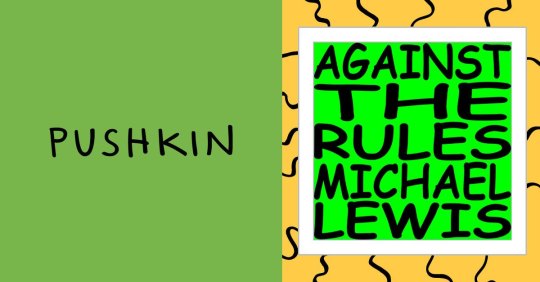
3. Against the Rules Season 2 (2020-21)
Michael Lewis (author of Moneyball, adapted into a film starring Jonah Hill), is interested in how we talk about fairness. This season he looks at how coaches impact fairness in areas like college admissions, credit cards, and youth sports.
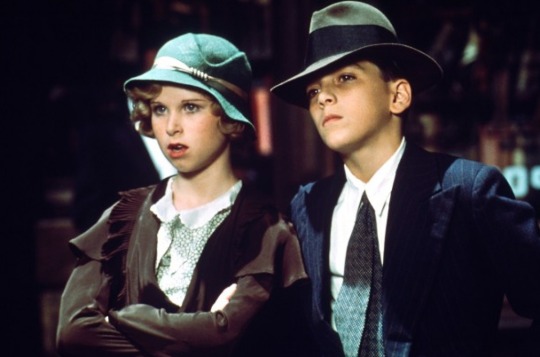
4. Bugsy Malone (1976)
A gangster musical starring only children? It’s a little like someone just picked ideas out of a hat, but somehow it works. You can hear why in the Bugsy Malone episode Kyla and I released this month on SO IT’S A SHOW?, plus how this weird artifact of a film connects with Gilmore Girls.
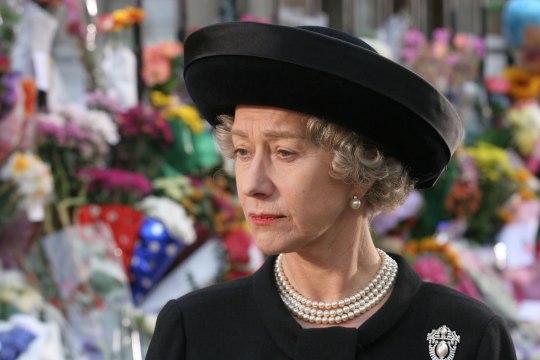
5. The Queen (2006)
Before The Crown, Peter Morgan wrote The Queen, focusing on Queen Elizabeth II (Helen Mirren) in the days following the death of Princess Diana. It’s a complex and compassionate drama, both for the Queen and for Prime Minister Tony Blair (Michael Sheen, who has snuck up on me to become a favorite character actor). Maybe I’ve got a problem, but I’ll never tire of the analysis of this famous family. Crowd: 8.5/10 // Critic: 9.5/10
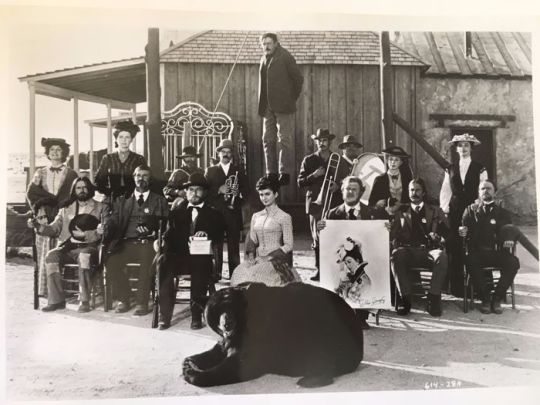
6. The Life and Times of Judge Roy Bean (1972)
This month at ZekeFilm, we took a closer look at Revisionist Westerns we’ve missed. I fell hard for Roy Bean, and I think you will, too, if for no other reason than you might like a story starring Jacqueline Bisset, Ava Gardner, John Huston, Paul Newman, and Anthony Perkins. Oh, and a bear! Crowd: 8.5/10 // Critic: 10/10
youtube
7. New Trailer Round Up
Naked Singularity (Aug. 6) – John Boyega in a crime thriller!
Queenpins (Aug. 10) – A crime comedy about extreme coupon-ing!
Dune (Oct. 1) – I’ve been cooler on the anticipation for this film, but this new look has me cautiously intrigued thanks to the Bardem + Bautista + Brolin + Chalamet + Ferguson + Isaac + Momoa + Zendaya of it all.
The Last Duel (Oct. 15) – Affleck! Damon! Driver!
Ghostbusters: Afterlife (Nov. 11) - I’m not sure why we need this, but I’m down for the Paul Rudd + Finn Wolfhard combo
King Richard (Nov. 19) - Will Smith as Venus and Serena’s father!
Encanto (Nov. 24) – Disney and Lin-Manuel Miranda making more magic together!
House of Gucci (Nov. 24) - Gaga! Pacino! Driver!
Also in July…
Kyla and I took a look at the classic supernatural soap Dark Shadows and why Sookie might be obsessed with it on Gilmore Girls.
I revisited a so-bad-it’s-good masterpiece that’s a surrealist dream even Fellini couldn’t have cooked up. Yes, for ZekeFilm I wrote about the Vanilla Ice movie, Cool as Ice, which is now a part of my Blu-ray collection.
Photo credits: Against the Rules. All others IMDb.com.
#Round Up#Mystery Date#The Pallbearer#The Tomorrow War#Dream a Little Dream#Black Widow#Liar Liar#Bugsy Malone#Sob Rock#John Mayer#Sob Rock John Mayer#The Sum of All Fears#State of Play#Loki#The Whole Nine Yards#Summer of Soul#Good Morning Vietnam#Against the Rules#The Life and Time of Judge Roy Bean#Die Hard With a Vengeance#This Is the End#The Queen
11 notes
·
View notes
Text
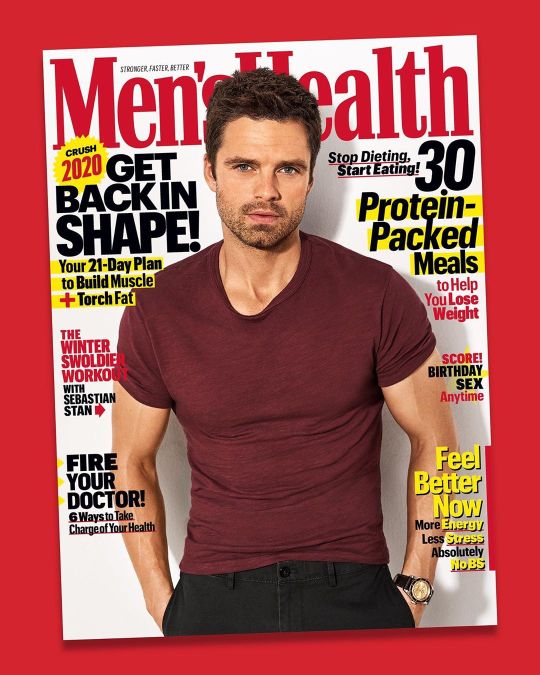
How Sebastian Stan Went From Winter Soldier to 'Winter Swoldier'
To keep up with the Chrises, Stan upgraded his diet, training, and worldview. And 2020 is shaping up to be his best year ever.
BY LAUREN LARSON
DEC 19, 2019
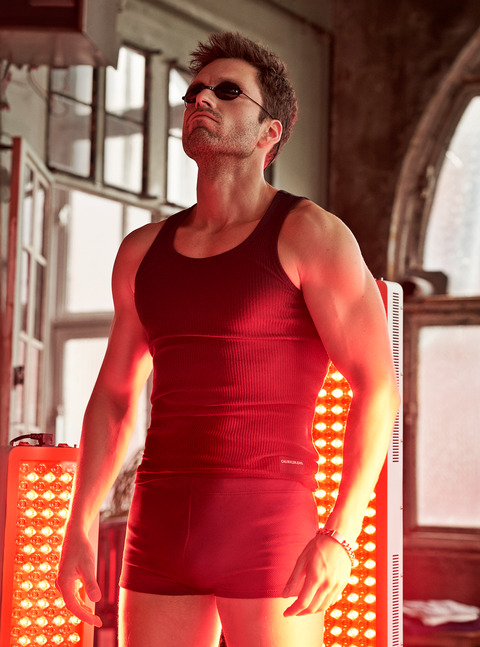
THE COFFEE-SHOP staff is having a silent meltdown. The peppermint tea I ordered was forgotten as soon as Sebastian Stan walked in. He orders a coffee, receives it instantly, and goes to put it down on a table. The lid isn’t fully on, and the coffee spills. It’s almost a “stars are just like us” moment, but then a barista suddenly materializes with a paper towel in his outstretched palm. “It’s wet,” he says eagerly.
Stan, 37, is wearing black shorts, a black T-shirt, midcalf black socks, and a gray hoodie missing its drawstring. He looks very off-duty SoHo, which he is: He’s back home in New York City on furlough from preparations for The Falcon and the Winter Soldier, an extravagant collaboration between Marvel and newborn streaming service Disney+.
He’s also wearing a blue baseball cap, which sits slightly higher on his head than it might on the head of someone with less va-va-voom hair. That hair sent the Internet into a tizzy recently, when a poster for Falcon showed Stan with a short cut. In the past when Stan has played the Winter Soldier (né Bucky Barnes), he’s had shoulder-length hair. Next to his forehead, which is giant—the White Cliffs of Dover of foreheads—the longer style made him look very sinister.
Stan is somewhat less recognizable in street clothes, but women still side-eye him on their way to the bathroom. Maybe they recognize him; maybe he’s just a little too strapping not to be famous.
As Stan talks, he maintains an unsettling deadpan, verging on a glower. “People always ask me if I’m okay,” he says, still glowering. “They’ve said I have ‘serial-killer resting face.’ No matter what I do, I’ve always had dark circles under my eyes that never really go away. Lately there might be a little moisturizer happening here and there, just in case. Preserving a couple years, or whatever.”
The more reserved the actor, the more likely he is to become part of Hollywood mythology. Between Captain America: The Winter Soldier (2014) and Captain America: Civil War (2016), a rumor circulated that he had gotten too ripped for the arm he’d worn in the earlier film, a wraparound contraption meant to look like a machine prosthetic. Redditors called him “the Winter Swoldier” and “Bulky Barnes.”
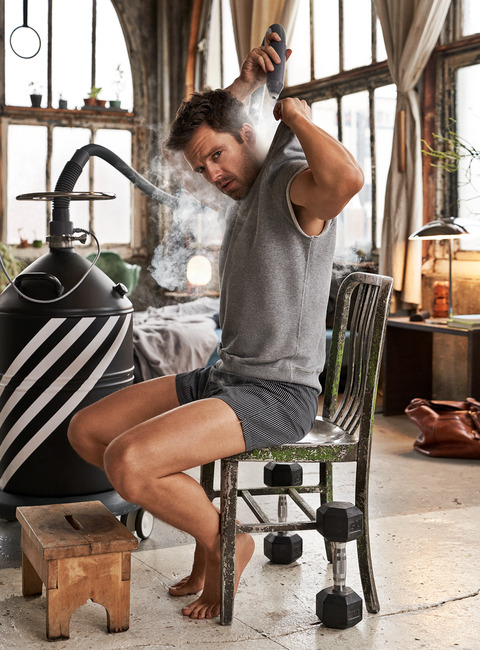
Stan laughs when I bring it up and clarifies that he used a new-and-improved arm in each successive film. With the first iteration, he had to apply lube to slide his real arm into what was essentially two rigid metal tubes. “It was like having a massive hammer attached to me,” he says, “but it looked unbelievable in the movie, and it actually informed a lot of my body language.”
Subsequent arms were more mobile, and Stan doesn’t have to lube up to get in there anymore: There’s a sleeve inside the arm for his next appearance as the Winter Soldier. But, he concedes, he did get too big for the arm used in Civil War. “I was so insecure being around these massive fucking guys, so I started lifting really heavy and ate a lot. I remember I showed up, and I was a little bit bigger than I had been in The Winter Soldier. The arm was a bit tight,” he says. “I was losing circulation.”
Stan is not a new arrival in the Marvel universe: He made his superhero debut in 2011, with Captain America: The First Avenger. But recently he’s enjoyed a burgeoning late-term fandom as his roles (and arms) have ballooned. Beyond Marvel, he starred alongside Margot Robbie in 2017’s I, Tonya, as Tonya Harding’s jackass boyfriend. When we meet in October, he’s just returned from shooting the spy film 355 in London, with Jessica Chastain, Penélope Cruz, Lupita Nyong’o, and Diane Kruger. Another insecurity-inspiring roster.
With Stan’s constellation of anxieties—he says he’s “terribly self-aware, to the point of detriment”—he is uniquely suited to stardom in 2020. A decade ago, audiences wanted actors to be pillars of Hollywood hubris, strutting around in latex Marvel suits, muscly and impenetrable. We still want the muscles, but we also want stars to be genuine.
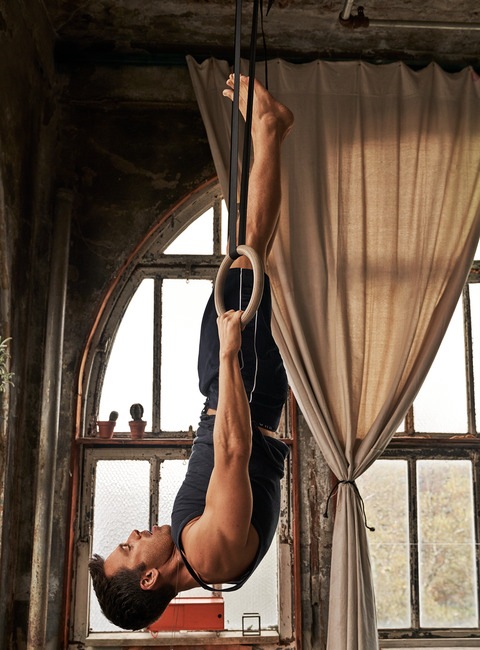
Marvel films can seem at odds with that national craving for authenticity. Steve Rogers, for example, becomes Captain America instantly, in the first ten minutes of The First Avenger: He goes into a machine and emerges fit, huge, and self-actualized. I ask Stan whether that narrative—man gets muscles and immediately earns the admiration and attraction of everyone in his midst—isn’t a dated, unrelatable picture of masculinity.
“When I was watching Steve Rogers,” Stan starts in, “I saw him question his identity, his alliances, the government. ‘Who am I? What is this? What made me come into this is very different than the role I am in now.’ I think it was very timely, in the sense that you could see that character evolve. Then he gives up his shield and is like, ‘I’m out. I’m going to do my own thing.’ He chooses his own life. It’s actually more relatable.”
There’s an obvious metaphor there: Stan is Captain America, and stardom—and the press tours, the scrutiny, and the training that come with it—is his government, always invading his carefully fortified sense of self. As a result, he can appear very reticent in public, offering only occasional glimpses of the unguarded Sebastian Stan. Audiences live for those moments.
Stan is the anti-celebrity in the year of the anti-celebrity.
And his ambient hostility toward questioning is offset by the behavior of his Falcon costar Anthony Mackie. When alone in interviews, Stan can seem deflective and bored, but he gets an enormous kick out of Mackie, who has jumped in to rescue many an interviewer left to writhe on the hook by Stan. He is the Sebastian Stan whisperer, midwife to a charm that can be difficult to coax out.
“When I’m trying hard to find the honest moment, he sort of unlocks me a little bit. We both laugh and we find a way to have a good time,” Stan says. When I tell him that I’m planning to mine Mackie for gossip, he laughs. “Here’s what he’s going to say: ‘He’s way too serious. It’s boring. He slows everything down. It’s always these questions and, like, the stare. Give this kid a Yoo-hoo! Somebody get him a chocolate milk. Good God, put a smile on his face!’ ”
Mackie is the enthusiastic extrovert to Stan’s pensive recluse. Even though I reach him on the phone at 9:00 p.m. after a long day of shooting in Savannah—“I’m already going to bed,” Mackie says in a N’awlins drawl that sounds sleepier than usual—he’s forthcoming about Stan. He describes his costar as a hermit, a chronic Irish-goodbye-er who doesn’t offer much of himself at first. “If the FBI ever needed to get anything out of him, they’d be in very big trouble,” Mackie says. “I don’t know what the male equivalent would be of ‘resting bitch face,’ but Sebastian has nailed that 100 percent.”
His first impression, which lingered for a long time, was that Stan was a very quiet, very reserved actor. They shook hands when they met, but it wasn’t a buddy-com bromance at first sight. It wasn’t until much later, when the two were on a press tour for The Winter Soldier, that they hit it off. Mackie hung out with Stan and a few of his closest friends, and they “unlocked” Stan for Mackie the same way Mackie now unlocks Stan on press tours.
Their chemistry also plays well on set. They share a dedication to their work, and they both come from classical acting backgrounds. (“He went to Juilliard,” Stan says of Mackie. “He can do anything.”) Beyond that, they’re opposites, reining in each other’s moods to a perfect, workable middle. “He calms me down when I’m ready to rage against the machine,” Mackie says. In turn, Mackie bullies Stan into having fun.
Case in point: When they were on a press tour in Beijing, they had one of those endless nights that make press tours seem glamorous. “It just went on and on and on,” Mackie recalls. “We had to do press the next morning, and he’s like, ‘I’m going to bed.’ I’m like, ‘Nope.’ I took his wallet and his cell phone so he couldn’t get into his hotel room. Then, by the time we got to the press, I was fine. He just looked like he’d gotten hit by a car.”

Hollywood has always relished actor partnerships—from Robert Redford and Paul Newman to Ben Stiller and Owen Wilson—but now more than ever, buddying up feels like an imperative. Pairs perform, especially on social media. In November, when Stan and Mackie took over Marvel Studios’ Instagram to announce that they’d begun filming Falcon, fans were as thirsty for their friendship as they were for the show. Their dynamic is the stuff of memes: “[I] want someone to look at me the way Sebastian Stan and Anthony Mackie look at each other,” one fan tweeted.
I know what that fan meant. When Stan does look at you without suspicion—when, perchance, he laughs at something you say—it’s like winning a battle.
WHEN IT COMES to fitness, Stan has also benefited from the influence of a charismatic spirit guide. He played soccer and basketball at his Rockland County, New York, high school, but he didn’t start running and going to the gym until he was in college at Rutgers University. And he didn’t get really into fitness until 2005, when he was cast in a film titled The Covenant, which Stan calls “really classic.”
Really classic, indeed: The Covenant also stars Chace Crawford, whom Stan would later join on Gossip Girl (another classic), and Taylor Kitsch. Stan plays one of five prep-school boys endowed with supernatural gifts and sick abs.
“I got a call,” Stan says. “And one of the producers said to me, ‘Look, you’re going to have to look like John Travolta in Staying Alive.’ He’s just glistening with muscles. It’s ridiculous. I was like, ‘Oh my God.’ I started to work out with a trainer, but it was my buddy
Taylor Kitsch who got me into it.” With the trainer and Kitsch as his gym shepherds, Stan began exercising in earnest.
Then, in 2013, ahead of The Winter Soldier, Stan teamed up with trainer Don Saladino, who’d also sculpted Ryan Reynolds, John Krasinski, and Liev Schreiber. That same year, Stan starred in a Broadway revival of William Inge’s Picnic, playing a character whose defining trait is his hotness.
“Inge was writing something very important about vanity and how people were perceived in terms of being quote-unquote good-looking, beautiful, or pretty,” Stan said in a Playbill interview in 2013. “In the play, there’s something shameful and dirty about it. Our obsession with beauty has not changed. When we see something that turns us on, we either appreciate it or judge it. It’s so primal. We still dismiss people if they’re pretty; we don’t care how they feel, because they should just be happy looking the way they do. That’s something we were trying to say with this production.” Stan is less philosophical about his Picnic bod these days. “I had to be basically shirtless every night, like eight shows a week,” he says. “I really zoned in on diet, and everything transformed.”
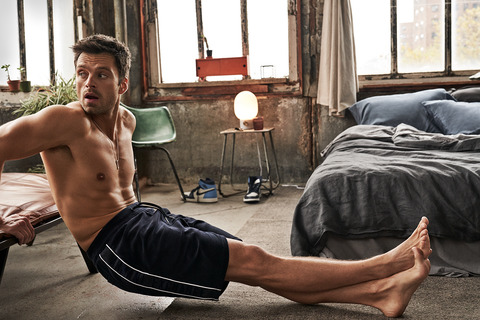
He prefers exercising on an empty stomach, so he generally starts his day with coffee—and a rice cake with some almond butter and honey if he’s feeling depleted. Today he was feeling very depleted, he says, so he had some scrambled eggs with Brussels sprouts and aioli. “I’m not going to tell you the place where I got that,” he adds, unprompted and wary, as though I might start dining there daily in a stalker vigil.
Stan is a proponent of “quality over quantity,” but that doesn’t mean he skimps on his workouts; he just knows that a 20-minute session that catapults his heart rate into the red zone is as effective as an hour of low-intensity bullshit. He runs (“I’m not going to tell you where”) when he’s feeling meditative.
In advance of the Falcon shoot, Stan started lifting weights every morning and knocking out stunt training for the fight scenes. He points out that filming an action movie is a workout in itself: You spend whole days running around and sweating in a heavy suit. “I mean, next to Evans and Hemsworth and all those guys, I feel like I’m 50 miles behind. I don’t think I can get to that size, to be honest,” he says. That aside, Stan feels, in his late 30s, better than ever. “My body right now is probably the best it’s ever been.”
THERE'S A PHOTO of Stan, age 15, on his Instagram. It’s a headshot from Stagedoor Manor, an acting camp that he attended while in high school. He’s recognizable from the brow up—he has the same broad forehead, the same voluminous hair. His arms look pale and soft, like overcooked linguine, and he’s staring down the camera with theater-kid intensity.
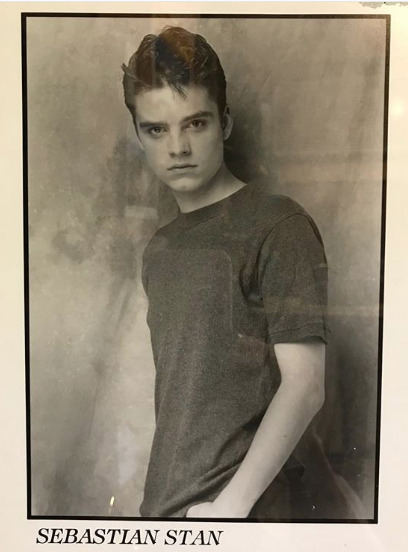
Stan lived in Romania until he was eight years old. Shortly after the Romanian revolution, he and his mother moved to Vienna and stayed there for four years before heading to New York in 1995. No, he says, he didn’t have a foreign exchange student’s social cachet in middle school. “Maybe if I was from France or something. But I am Eastern European. We left communism,” he says. “When I came here, I just wanted to be like everybody else.”
I ask Stan which of his mannerisms are typically Romanian. “You’re kind of putting me on the spot to define a whole nation—a guy who hasn’t been there for years,” he says. But he thinks for a second. “For me, based on my mother, the ‘Romanian temperament’ is perseverance—being able to handle more than you think you can. At 27, my mother was working two jobs in a foreign country where she barely spoke the language. There’s a sense of family and perseverance that’s deeply ingrained in the blood.”
Even for someone who has experienced a certain degree of stardom, Marvel fans can be a shock to one’s sense of family. Certain Marvel stars acquiesce to the attention on some level, greeting fans with a Chris Hemsworthian openness to scrutiny. Stan’s boundaries are reflexive and firm, as though his sense of self is always under attack. (Which, to be fair, it may well be: “He’s so reserved,” Mackie says, “but in this day and age that’s a very good quality.”)
Stan is more protective of his personal life than most actors. Celebrities often use social media to dispense calculated chunks of themselves in exchange for privacy. Stan occasionally opens up on Instagram: “Been working with this guy through years of self judgement and mental wars when it comes to fitness and LIFE,” he wrote of Saladino in a caption accompanying a gym selfie. But questions about the people in his orbit ping ineffectually against his poker face.
He attributes this to only-vaguely-alluded-to incidents in which his family and friends were subject to public attention. As a public figure, he has opted into that attention, he explains, but they haven’t. It upset him when they were the targets of scrutiny, particularly when that scrutiny came from his fans. Stan seems to be looking for earnestness in an industry that, on the whole, disdains earnestness. He “tries hard to find the honest moment,” as he himself puts it (much like how he saw a profound statement about “our obsession with beauty” in William Inge’s horny play).

In this, the Marvel universe is an improbably good fit for him. We speak the week after Martin Scorsese said Marvel films “are not cinema,” and Stan is as defensive of the films as he can be without disrespecting Scorsese, one of his heroes. “All I know is that all movies affect people,” he says. “I’ve certainly experienced firsthand many people who have been affected and helped by Marvel movies.”
Captain America fans lean earnest. People have told Stan that Bucky Barnes helped them cope with their PTSD. During Q&A sessions, he’s asked questions like “What would Bucky Barnes’s major be?” and “What happened to Bucky Barnes when he fell from the train?” Stan fields those questions without sarcasm or diversion.
“They think we are these people,” Stan says, again without condescension. He’s content to take questions about Bucky Barnes, especially if it distracts fans from asking questions about Sebastian Stan. “Now we’re much more obsessed with the personality rather than the actor. We take people and swallow them and digest them and chew them up, and then we spit them out the other side. Then we’re done,” he says. “We’ve done that with numerous celebrities—people. I’ve seen people have massive ups and downs and stuff. All I can do is just try to be as honest as I can. And do my job.”
Men's Health Magazine, December 19, 2019.
1K notes
·
View notes
Text
Stiller the one - The Age, April 3, 2004
Ben Stiller is not quite as funny off-screen. He's happy to leave the gags to his sidekick Owen Wilson, writes Catherine Shoard.
If you're meeting Ben Stiller, be sure to stock up at the sweet shop first. "Ben can get kind of cranky," smiles Owen Wilson, Stiller's friend and co-star. "I can always tell when he's sort of fading, when he needs some M&Ms. That's when I maybe want to say 'OK, Ben, I'll catch you later'."
Wilson knows his stuff. A quick glance at Stiller, who looks about ready to implode, tells you that. The M&Ms tip is evidently the product of years of experience - these two have worked together six times in the past decade, on the likes of Meet the Parents, Zoolander, The Royal Tenenbaums (which Wilson co-wrote) and The Cable Guy (which Stiller directed). Their latest project is a big-screen version of the classic 1970s cop show Starsky & Hutch, with Stiller as uptight Starsky and Wilson as low-strung Hutch.
Wilson is, as expected, less sitting than lolling, slightly crumpled, on one hip. Tall, blond and looking ready for bed in a sweatshirt and misshapen leggings, he's even less flappable than on screen, with a slow grin so infectious that you smile even when he doesn't. The famous twice-broken nose doesn't disappoint; neither does the trademark mangled Texan twang.
Stiller, too, is rather as you'd imagine: tiny, precise, tightly Upper West Side. Just with rather more confidence, and rather less good humour. He drums on his knees and bats away questions while fixing you with the kind of stare that on screen might seem amusingly intense, but in the flesh could freeze blood at 50 paces.
Odd-couple chemistry is one thing, but these two seem to be from different planets. Yet they clearly get along. Are they competitive? "Never," says Stiller, with the economy he seems to favour.
So who's the sidekick? "We're each other's sidekicks," he snaps strictly. "There is no hierarchy."
"Yeah, though it is Starsky and Hutch," adds Wilson, less convinced.
Wilson does seem to be something of a professional buddy, already having doled out the slacker yang to the manic yin of Jackie Chan (in the very funny Shanghai Noon and Shanghai Knights), and Eddie Murphy (in the not-so-funny I Spy). Behind the screen too he's rarely alone - co-writing the acclaimed comedies Bottle Rocket, Rushmore and The Royal Tenenbaums with his college pal Wes Anderson, and frequently teaming up with his brothers, Luke and Andrew. Wilson, it seems, loves company.
Misery, or rather Stiller, is much more of a solo artiste, his talent honed over years of stand-up and on HBO's The Ben Stiller Show. "I haven't had that many sidekicks," he confirms, "but I do like working with Owen - we have a real comfortability. To me, it takes the pressure off to have somebody else who's really funny."
Wilson agrees. "I'm always hoping someone's gonna do the heavy lifting and bring in the box office."
In fact, Starsky & Hutch does feel more like Stiller's project. His company, Red Hour Films, produced, and Starsky comes out of the movie marginally better. Stiller flexes his comedy muscles harder, and gets the bigger laughs. By contrast, Wilson's stoner schtick, though enjoyable, winds up looking if not quite tired, then certainly a little sleepy.
Could this be why Wilson is being so deferential towards his friend? Today, at least, he's definitely Good Cop: chatty, polite, laughing at everyone's lines, coaxing answers out of Stiller when he's sticky. Yet he's the one with the Oscar nomination (for writing The Royal Tenenbaums) and the mushrooming female fanbase. Perhaps he's just buttering him up in lieu of chocolate. More likely it runs deeper. Stiller was Wilson's boss when they first met on The Cable Guy (1994). Stiller, now 38, also has a three-year age advantage.
Wilson even nominates a Stiller setpiece (Starsky unveiling his undercover disguise) as his favourite scene in the film. "I really liked that, the way Starksy is so committed to this character. Ben's just so damn funny in that bit. And Hutch doesn't have a character because he can't do any other voices, so he just steals Starsky's and does it really badly. I loved that."
Does Wilson himself feel he lacks range? "Yeah, a little bit. I think maybe because I didn't train as an actor like, say, Robert de Niro, I lack a bit of confidence. But then you think about someone like Gene Hackman who's just great but who doesn't really change too much, just makes each role his own.
"I'd definitely like to try something a bit more serious," he muses, sensitive to the sell-by date on his back-of-the-class charms. "Broad comedy can be a bit of a bind. That said, it would be strange to do something with no laughs at all. I mean, even Raging Bull has got a lot of funny stuff in it."
What do they most like about each other? "I like hanging out with Owen," says Stiller. "Though he can be elusive." Another pause. "Well," says Wilson, "when we first became friends we were both kind of single and out there, and now Ben seems to be so very sort of married, and I kind of like and kind of envy that. Having a home and a little kid running around."
Is he getting ideas (Wilson has been with his actress girlfriend Gina Gershon for four years)? "Maybe. I always imagined I'd have kids pretty young. My dad had three boys by the time he was 30, and I'm 35 now. But I seem to be too busy going to the beach and stuff."Is Stiller enjoying fatherhood? "Yeah. It's the best thing." And what about being a pin-up, does he like that? "I'm not a heartthrob." But doesn't his, and Wilson's, appeal partly stem from the fact that while attractive they're not conventionally good-looking?"Oh, I don't deal with that. Next." What does Wilson think? "Well, if I'd never broken my nose, I think my career would probably have been much bigger and better." They both chuckle for a moment, but then Stiller gets snippy again. "His career, my career, has nothing to do with looks. That's a ridiculous question. Anyway, Owen's got no problem with that aspect of his life."
"Oh well, most people are nice," grins Wilson, "I like that, people being friendly. And you can recognise the signs if someone's gonna be a little off.""It's strange," chips in Stiller. "People have a preconceived notion of who you are, yet you don't know them. So you're at a disadvantage."
Perhaps that's what's been bothering him. So what do people miss? "Nothing. It's just a strange situation. They know you, yet you don't know them.""Oh Ben," mock-sobs Wilson. "The tears of a clown." And, at that, Stiller smiles. Briefly.
3 notes
·
View notes
Video
tumblr
'Loki' takes over: Tom Hiddleston on his new TV series and a decade in the MCU
Ten years after Hiddleston first chose chaos in Thor, Marvel’s fan favorite God of Mischief is going even bigger with his time-bending Disney+ show.
Tom Hiddleston is Loki, and he is burdened with glorious purpose: After playing Thor's puckish brother for over a decade in the Marvel Cinematic Universe, no one understands the mercurial Asgardian God of Mischief as well as the actor. He can teach an entire seminar on Loki if given the opportunity — which he actually did during pre-production on his forthcoming Disney+ show. In conversation, Hiddleston quotes lines from his MCU debut, 2011's Thor, almost verbatim, and will playfully correct you if you mistakenly refer to Asgard's Rainbow Bridge as the Bifrost, which is the portal that connects Loki and Thor's homeworld to the Nine Realms, including Midgard, a.k.a. Earth. "Well, the Bifrost technically is the energy that runs through the bridge," he says with a smile. "But nine points to Gryffindor!" And when he shows up to the photo shoot for this very digital cover, he hops on a call with our photo editor to pitch ways the concept could be even more Loki, like incorporating the flourish the trickster does whenever magically conjuring something. The lasting impression is that playing Loki isn't just a paycheck.
"Rather than ownership, it's a sense of responsibility I feel to give my best every time and do the best I can because I feel so grateful to be a part of what Marvel Studios has created," the 40-year-old Brit tells EW over Zoom a few days after the shoot and a week out from Thor's 10th anniversary. "I just want to make sure I've honored that responsibility with the best that I can give and the most care and thought and energy."
After appearing in three Thor movies and three Avengers, Hiddleston is bringing that passion to his first solo Marvel project, Loki, the House of Ideas' third Disney+ series following the sitcom pastiche WandaVision and the topical The Falcon and the Winter Soldier. Led by head writer Michael Waldron (Doctor Strange in the Multiverse of Madness, Heels), the six-episode drama sees Hiddleston's shapeshifting agent of chaos step out from behind his brother's shadow and into the spotlight for a timey-wimey, sci-fi adventure that aims to get to the bottom of who Loki really is. "I wanted to explore slightly more complex character questions," says Waldron. "It's not just good versus bad. Is anybody all good? Is anybody all bad? What makes a hero, a hero? A villain, a villain?"
Even though Loki — who loves sowing mayhem with his illusion magic and shapeshifting, all with a major chip on his shoulder — has never been one for introspection, the idea of building an entire show around him was a no-brainer for Marvel. When asked why Loki was one of the studio's first Disney+ shows, Marvel president Kevin Feige replies matter-of-factly, "More Hiddleston, more Loki." First introduced as Thor's (Chris Hemsworth) envious brother in Kenneth Branagh's Thor, Loki went full Big Bad in 2012's The Avengers. That film cemented the impish rogue as one of the shared universe's fan favorites, thanks to Hiddleston's ability to make him deliciously villainous yet charismatic and, most importantly, empathetic. The character's popularity is one of the reasons he's managed to avoid death many times.
"He's been around for thousands of years. He had all sorts of adventures," says Feige. "Wanting to fill in the blanks and see much more of Loki's story [was] the initial desire [for the series]."
The Loki we meet on the show is not the one who fought the Avengers in 2012 and evolved into an antihero in Thor: The Dark World and Thor: Ragnarok before meeting his demise at the hands of the mad titan Thanos (Josh Brolin) in 2018's Avengers: Infinity War. Instead, we'll be following a Loki from a branched timeline (a variant, if you will) after he stole the Tesseract following his thwarted New York invasion and escaped S.H.I.E.L.D. custody during the time heist featured in Avengers: Endgame. In other words, this Loki hasn't gone through any sort of redemption arc. He's still the charming yet petulant god who firmly believes he's destined to rule and has never gotten his due.
Premiering June 9, Loki begins with the Time Variance Authority — a bureaucratic organization tasked with safeguarding the proper flow of time — arresting the Loki Variant seen in Endgame because they want his help fixing all of the timeline problems he caused while on the run with the Tesseract. So there will be time travel, and a lot more of it than in Endgame. As Loki makes his way through his own procedural, he'll match wits with new characters including Owen Wilson's Agent Mobius, a brilliant TVA analyst, and Gugu Mbatha-Raw's Judge Renslayer. The question in early episodes is whether Loki will help them or take over.
"One of the things Kevin Feige led on was, 'I think we should find a way of exploring the parts of Loki that are independent of his relationship with Thor,' or see him in a duality or in relationship with others, which I thought was very exciting," says Hiddleston, who also serves as an executive producer on the show. "So the Odinson saga, that trilogy of films, still has its integrity, and we don't have to reopen it and retell it."
Yet, in order to understand where Loki is going, it's important to see where he came from.
Hiddleston can't believe how long he and Loki have been connected. "I've been playing this character for 11 years," he says. "Which is the first time I have said that sentence, I realize, and it [blows] my mind. I don't know what percentage that is exactly of my 40 years of being alive, but it's substantial."
His time as Loki actually goes a bit further back, to 2009 — a year after Robert Downey Jr. big banged the MCU into existence with Iron Man — when he auditioned for Thor. It's no secret that Hiddleston initially went in for the role of the titular God of Thunder, but Feige and director Kenneth Branagh thought his natural charm and flexibility as an actor made him better suited for the movie's damaged antagonist. "Tom gave you an impression that he could be ready for anything, performance-wise," says Branagh, who had previously worked with him on a West End revival of Checkov's Ivanov and the BBC series Wallander. "Tom has a wild imagination, so does Loki. He's got a mischievous sense of humor and he was ready to play. It felt like he had a star personality, but he was a team player."
Hiddleston fully immersed himself in the character. Outside of studying Loki's history in the Marvel Comics, he also researched how Loki and the Trickster God archetype appeared across mythology and different cultures. "He understood that he was already in something special [and] it was a special character in a special part of that early moment in the life of the Marvel universe where [he] also needed to step up in other ways," says Branagh, who was impressed by the emotional depth Hiddleston brought to the part, especially when it came to how isolated Loki felt in the Asgardian royal family.
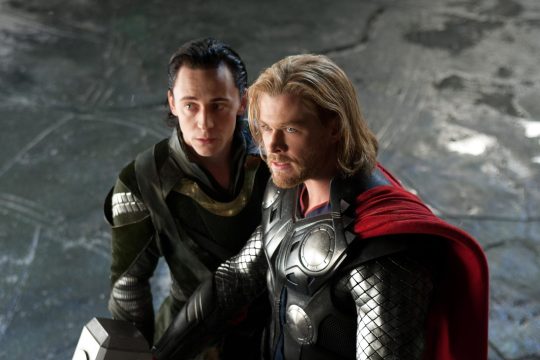
There was a lot riding on that first Thor feature. For one, no one knew if audiences would immediately latch onto a Shakespearean superhero movie partially set on an alien planet populated by the Norse Gods of legend. Second, it was integral to Feige's plans for the shared universe. Loki was supposed to be the main villain in The Avengers, which would not only mirror how Earth's mightiest heroes joined forces in 1963's Avengers #1 but also give Thor a believable reason for teaming up with Iron Man, Captain America (Chris Evans), and the rest of the capes. Feige first clued Hiddleston into those larger plans when the actor was in L.A. before Thor started shooting.
"I was like, 'Excuse me?' Because he was already three, four steps ahead," says Hiddleston. "That took me a few minutes to process, because I didn't quite realize how it just suddenly had a scope. And being cast as Loki, I realized, was a very significant moment for me in my life, and was going to remain. The creative journey was going to be so exciting."
Hiddleston relished the opportunity to go full villain in Avengers, like in the scene where Loki ordered a crowd to kneel before him outside a German opera house: "It's the unspoken truth of humanity, that you crave subjugation," says the Machiavellian god. "The bright lure of freedom diminishes your life's joy in a mad scramble for power, for identity. You were made to be ruled. In the end, you will always kneel."
"I just knew that in the structure of that film, I had to lean into his role as a pure antagonist," Hiddleston recalls. "What I always found curious and complex about the way Loki is written in Avengers, is that his status as an antagonist comes from the same well of not belonging and being marginalized and isolated in the first Thor film. Loki now knows he has no place in Asgard."
Loki did find a place within the audience's hearts, though. Feige was "all in" on Hiddleston as his Loki from the beginning, but even he couldn't predict how much fans would love him. Feige recalls the reaction at the 2013 San Diego Comic-Con: "Did we know that after he was the villain in two movies, he would be bringing thousands of people to their feet in Hall H, in costume, chanting his name? No, that was above and beyond the plan that we were hoping for and dreaming of." It was a dream Feige first got an inkling of a year earlier during the Avengers press tour when a Russian fan slipped past security, snuck into Mark Ruffalo's car, and asked the Hulk actor to give Hiddleston a piece of fan art she created. "That was one of the early signs there was much more happening with this quote-unquote villain."
Despite that popularity, the plan was to kill Loki off in 2013's Thor: The Dark World, but the studio reversed course after test audiences refused to believe he actually died fighting the Dark Elves. Alas, he couldn't out-illusion death forever. After returning in Taika Waititi's colorful and idiosyncratic Thor: Ragnarok, Hiddleston's character perished for real in the opening moments of Infinity War. In typical Loki fashion, before Thanos crushed his windpipe, he delivered a defiant speech that indicated he'd finally made peace with the anger he felt toward his family.
"It felt very, very final, and I thought, 'Okay, that's it. This is Loki's final bow and a conclusive end to the Odinson saga,'" says Hiddleston, who shot that well-earned death scene in 2017.
But, though he didn't know it yet, the actor's MCU story was far from over.
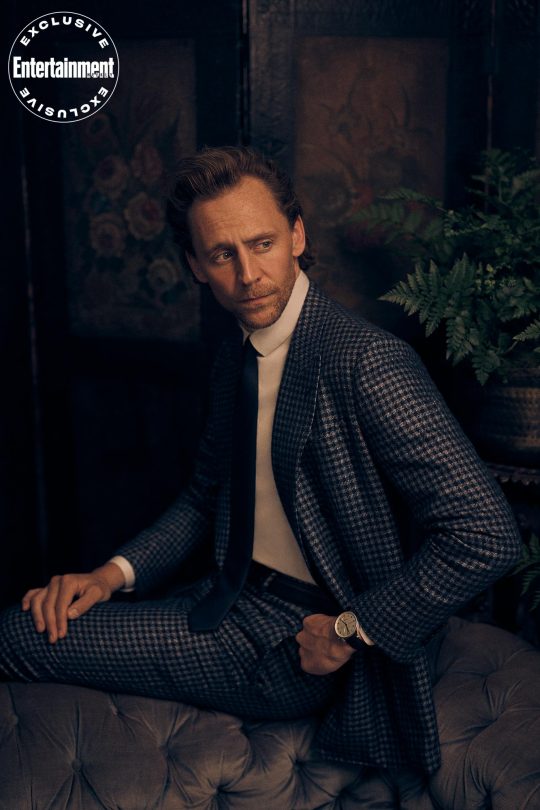
Credit: Charlie Gray for EW
When Hiddleston returned to film two scenes in Avengers: Endgame in 2017, he had no idea where Loki portaled off to after snatching the Tesseract. "Where'd he go? When does he go? How does he get there? These are all questions I remember asking on the day, and then not being given any answers," Hiddleston recalls. To be fair, it's likely the Powers That Be didn't necessarily have answers then. While Feige can't exactly recall when the writers' room for Endgame first devised Loki's escape sequence, he does know that setting up a future show wasn't the primary goal — because a Loki series wasn't on the horizon just yet.
"[That scene] was really more of a wrinkle so that one of the missions that the Avengers went on in Endgame could get screwed up and not go well, which is what required Cap and Tony to go further back in time to the '70s," says Feige. Soon after that, though, former Disney CEO Bob Iger approached Feige about producing content for the studio's forthcoming streaming service. "I think the notion that we had left this hanging loose end with Loki gave us the in for what a Loki series could be. So by the time [Endgame] came out, we did know where it was going."
As for Hiddleston, he didn't find out about the plans for a Loki show until spring 2018, a few weeks before Infinity War hit theaters. "I probably should not have been surprised, but I was," says the actor. "But only because Infinity War had felt so final."
Nevertheless, Hiddleston was excited about returning for his show. He was eager to explore Loki's powers, especially the shapeshifting, and what it meant that this disruptive figure still managed to find a seat beside the gods in mythology. "I love this idea [of] Loki's chaotic energy somehow being something we need. Even though, for all sorts of reasons, you don't know whether you can trust him. You don't know whether he's going to betray you. You don't why he's doing what he's doing," says Hiddleston. "If he's shapeshifting so often, does he even know who he is? And is he even interested in understanding who he is? Underneath all those masks, underneath the charm and the wit, which is kind of a defense anyway, does Loki have an authentic self? Is he introspective enough or brave enough to find out? I think all of those ideas are all in the series — ideas about identity, ideas about self-knowledge, self-acceptance, and the difficulty of it."
“The series will explore Loki's powers in a way they have not yet been explored, which is very, very exciting.”
The thing that truly sold Hiddleston on the show was Marvel's decision to include the Time Variance Authority, a move he describes as "the best idea that anybody had pertaining to the series." Feige and Loki executive producer Stephen Broussard had hoped to find a place for the TVA — an organization that debuted in 1986's Thor #372 and has appeared in She-Hulk and Fantastic Four stories — in the MCU for years, but the right opportunity never presented itself until Loki came along. "Putting Loki into his own procedural series became the eureka moment for the show," says Feige.
The TVA's perspective on time and reality also tied into the themes that Waldron, Loki's head writer, was hoping to explore. "Loki is a character that's always reckoning with his own identity, and the TVA, by virtue of what they do, is uniquely suited to hold up a mirror to Loki and make him really confront who he is and who he was supposed to be," says Waldron. Hiddleston adds: "[That] was very exciting because in the other films, there was always something about Loki that was very controlled. He seemed to know exactly what the cards in his hand were and how he was going to play them…. And Loki versus the TVA is Loki out of control immediately, and in an environment in which he's completely behind the pace, out of his comfort zone, destabilized, and acting out."
To truly dig into who Loki is, the creative team had to learn from the man who knows him best: Hiddleston. "I got him to do a thing called Loki School when we first started," says director Kate Herron. "I asked him to basically talk through his 10 years of the MCU — from costumes to stunts, to emotionally how he felt in each movie. It was fantastic."
Hiddleston got something out of the Loki school, too. Owen Wilson both attended the class and interviewed Hiddleston afterward so that he could better understand Loki, as his character Mobius is supposed to be an expert on him. During their conversation, Wilson pointedly asked Hiddleston what he loved about playing the character.
"And I said, 'I think it's because he has so much range,'" says Hiddleston. "I remember saying this to him: 'On the 88 keys on the piano, he can play the twinkly light keys at the top. He can keep it witty and light, and he's the God of Mischief, but he can also go down to the other side and play the heavy keys. And he can play some really profound chords down there, which are about grief and betrayal and loss and heartbreak and jealousy and pride.'" Hiddleston recalls Wilson being moved by the description: "He said, 'I think I might say that in the show.' And it was such a brilliant insight for me into how open Owen is as an artist and a performer.'"
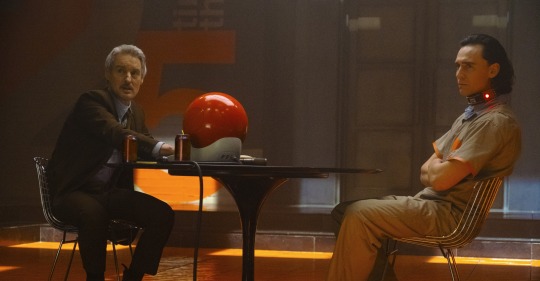
Owen Wilson as Mobius and Tom Hiddleston as Loki in 'Loki.'| Credit: Chuck Zlotnick/Marvel Studios
Everyone involved is particularly excited for audiences to see Hiddleston and Wilson's on-screen chemistry. "Mobius is not unlike Owen Wilson in that he's sort of nonplussed by the MCU," says Feige. "[Loki] is used to getting a reaction out of people, whether it's his brother or his father, or the other Avengers. He likes to be very flamboyant and theatrical. Mobius doesn't give him the reaction he's looking for. That leads to a very unique relationship that Loki's not used to."
As for the rest of the series, we know that Loki will be jumping around time and reality, but the creative team isn't keen on revealing when and where. "Every episode, we tried to take inspiration from different things," says Waldron, citing Blade Runner's noir aesthetic as one example.
"Part of the fun of the multiverse and playing with time is seeing other versions of characters, and other versions of the titular character in particular," says Feige, who also declined to confirm if Loki ties into Doctor Strange in the Multiverse of Madness and/or other upcoming projects.
Making Loki was especially meaningful to Hiddleston because they shot most of it during the pandemic, in late 2020. "It will remain one of the absolute most intense, most rewarding experiences of my life," he says. "It's a series about time, and the value of time, and what time is worth, and I suppose what the experience of being alive is worth. And I don't quite know yet, and maybe I don't have perspective on it, if all the thinking and the reflecting that we did during the lockdown ended up in the series. But in some way, it must have because everything we make is a snapshot of where we were in our lives at that time."
While it remains to be seen what the future holds for Loki beyond this initial season, Hiddleston isn't preparing to put the character to bed yet. "I'm open to everything," he says. "I have said goodbye to the character. I've said hello to the character. I said goodbye to the character [again]. I've learned not to make assumptions, I suppose. I'm just grateful that I'm still here, and there are still new roads to explore."
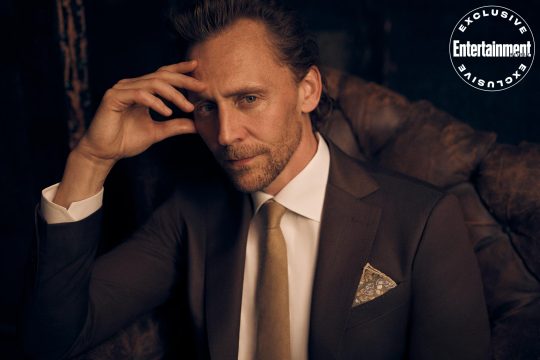
518 notes
·
View notes
Text
Taking a break from work so time to write up more of my Loki trailer thoughts since all the cool cats around here seem to be doing it :-D.
In chronological order:
1) Personally I was 'meh' about the trailer starting with the Endgame scene just because I think the Russos did a terrible job matching the tone of that scene with the tone of the original Avengers film's conclusion and I want the Loki series to feel like a continuation of Avengers. Alas, the Endgame scene grates on me as feeling inauthentic to the story it's supposed to take place in. But I certainly understand the practicality of needing to put it in to give the audience the context for when/how this new story with Loki is taking place.
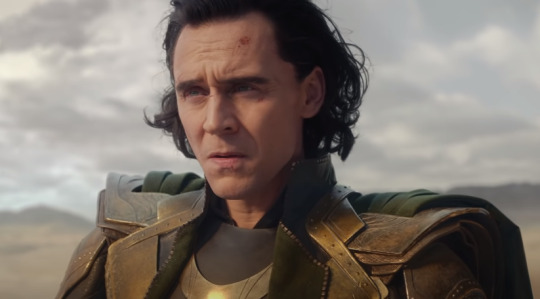
2) But five seconds later on the other side of the wormhole…yay, Kate Herron fixed the tone! This feels much closer in tone to when Thor and Lok depart for Asgard at the end of Avengers. Excellent job Kate.
3) Was so pleasantly surprised by Owen Wilson's portrayal! Very different than any of the comedic characters I strongly associate the actor's acting style with. I like his character a lot with what we've been given so far. It's instructive reflecting back on the potential concerns I had and that were being discussed in the fandom when we were working with scraps and rumors that we now know don't have merit: things like 'Hiddleston is only there to narrate the series' and 'How comedic in tone is this going to be if Waldron from Rick and Morty is hiring Owen Wilson?'. Ah the good old days of baseless speculation.

4) I mentioned the frequently low camera position in another post -- it does a poor job of conveying how Loki carries himself, tall and straight and elegant. It makes him seem more ordinary, but maybe that's the point -- equalizing him with Mobius rather than it being an Asgardian in a non-Asgardian's presence.
5) The way Loki goes from locked down and not letting any sense of what's going on his head slip to Mobius (what I feel is in-character for Loki) to suddenly being a lot more open with what he's actually feeling and having less guarded, more friendly/casual attitude toward Mobius is weird to me. I think it's a cut just for the trailer and hopefully it will make more sense in context, but Hiddleston's acting here and the way he has no qualms about being physically guided out of the elevator by Mobius is one of the points where it felt more like Hiddleston playing a different character than playing Loki to me (and lacking Loki's costuming doesn't help that perception certainly). Which I know is nitpicky, but I was just curious to see to what degree this would actually feel like 'fresh off of Avengers' Loki and so I'm paying close attention to what feels in and out of character for me. Does Mobius say something to really throw Loki for a loop that would cause him to drop his guard like that?
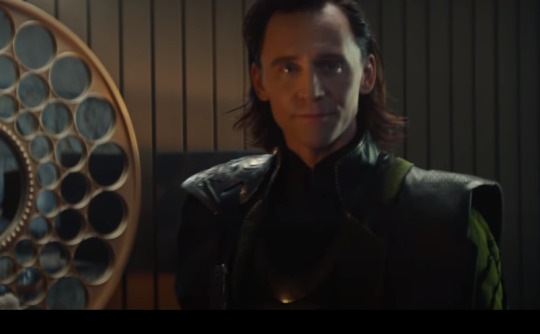
6) "Glorious" -> YAASSSS that's the Loki I wanted to recognize. He's back! I'm still having a hard time wrapping my head around how blessed I am, but we've got him back for more screen time. Also, with him back in Stark Tower and the later image of post-apocalyptic Manhattan, I am super intrigued by the possibility of Loki (and me too!) experiencing different ways things could have played out on Earth, if he'd succeeded in his conquest for example.
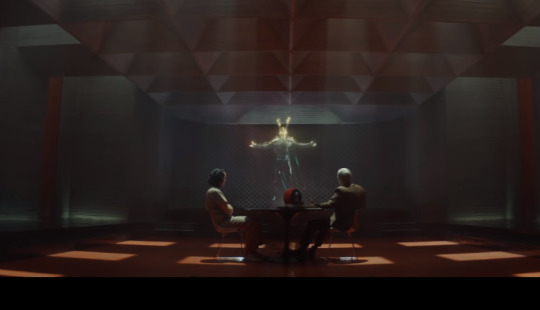
7) Loki's going to learn about what happened in the main timeline and the choices he made in the future?! That's huge! Should be a fascinating character moment. This bit of Loki turning away from the projector gives me a lot of hope that the writing in the show is actually going to explore, honor, and authentically run with where Loki was as a character at the end of Avengers and the context of what he experienced rather than Marvel just plopping the "general" character of Loki into a genre-fied crime thriller show basically disconnected from the events of Thor and Avengers so they can say they made a Loki show.
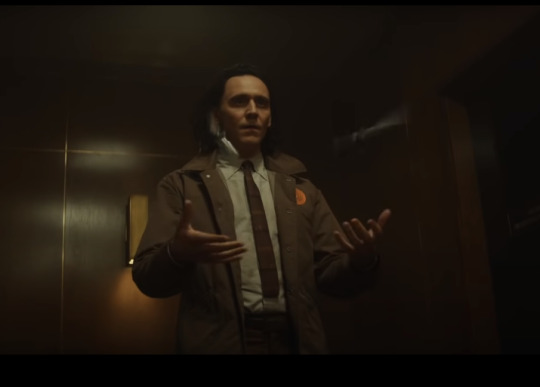
8) Do I like Loki in the beige detective jacket? Nah, not really. But I do appreciate that even with the earth costume they kept Loki's style of being completely covered up. Also creates contrast with him not being in control when he's in the TVA prisoner jumpsuit that has short sleeves.
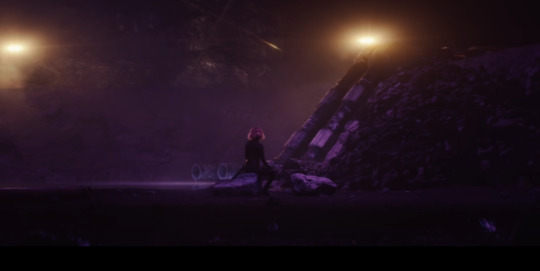
9) Thought that was Nat on Voromir at first because of the purple environment. Been reading some thoughts on how that's probably not Nat, and while the theories make sense, if that's true, why would Marvel put in a shot of a character that looks so much like Nat that it would cause confusion and maybe get her fans' hopes up?
10) I agree with @delyth88 on the D.B. Cooper scene. Didn't think I'd want Loki looking like Hiddleston, but I don't mind it / it's not taking me out of the scene as I might have expected.
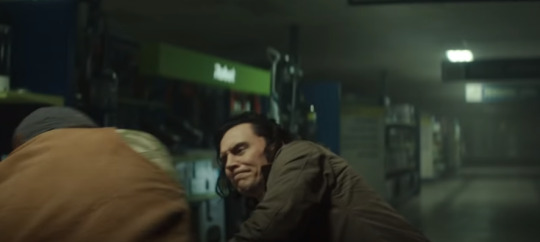
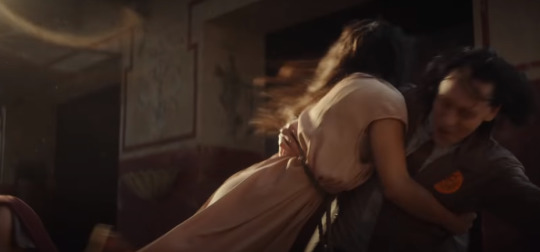
11) The fight choreo and edit into the twirling -- I already discussed this before, but the physicality of it is giving me human-strength!Loki vibes. If instead the guy he's fighting is also super strong, wouldn't the plastic or metal disc thing between them break upon impact? Also the fact that it seems implied that Loki would get hurt by jumping out of the plane w/o Heimdall’s help to catch him.
12) The twirling -- is Loki legitimately, celebratorily, uninhibitedly happy? I feel like we've never seen him like that since the Thor cut scene before they all made that fateful trip to Jotunheim. I read a theory that the roman numerals on the building in this frame might mean he is in Pompeii the year the volcano erupts, which is interesting.
13) Loki saying "Brother”, “Heimdall", coordinating with at least Heimdall, traveling on the Bifrost -- HOPE! BEAUTIFUL, WONDERFUL, HOPE! I was honestly expecting the show to make no mention of anything connected to Asgard, except maybe segueing into Thor 4 at the very end, so the fact that Loki is (indirectly) interacting with Heimdall -- calling Thor "Brother" (even if not to Thor) !!!!!!!!!!!! -- interesting!
14) The idea of him being D.B. Cooper is very fun! (though I didn't know who that was in advance). It's very easy to pretend that Loki is real and has been an unidentified part of our history all along.
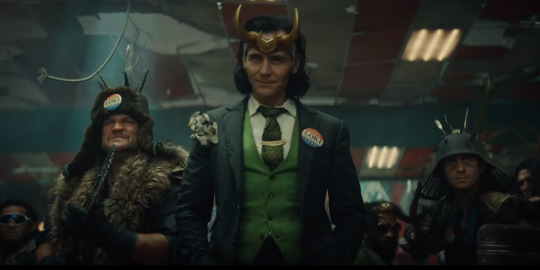
15) I do not like the last scene with comics!Loki suddenly being brought to life. In fact I had a very kneejerk dislike of it the first couple times I watched the trailer (so many watches ago :-P) because it presses a very personal button of mine, which is how the MCU is moving toward becoming more spectacle-driven and comic-book-y and therefore away from the grounded, character driven storytelling that I enjoy about the MCU. I'm here for the character of Loki that I love as he is already established in the MCU, not the comics versions of the character. Also, IMO the acting is out of character for MCU Loki and more goofy.
That said, I'm hopeful context will help a whole bunch here as @iamanartichoke has said. Given all the timey-wimey multiverse shenanigans, it's probably not even Avengers!Loki anyway, and I'm certainly not going to begrudge the many fans who are excited to see comics references on screen.
Overall impression? Very excited, very hopeful. Would I selfishly want a story that's just a direct continuation of the Avengers and hyper focused on the exact context of the character of Loki as he was in Avengers, fleshing out the off-screen bits and up-until-now only implied emotional impact of what Loki experienced between the end of Thor and the start of Avengers, digging into his relationships with the Black Order, and family, reconciling with his heritage? Uh…duh ;-).
But you have to give an audience what they need as opposed to what they think they want, and from a craft perspective, this has to be its own story. The Thor and Avengers stories are their own stories, they're told, they're done, even if certain emotional threads were left hanging / implied / off-screen that we as very detail-oriented Loki fans would like to see dealt with explicitly.
But given that this was always going to be its own story, I'm very hopeful that the series has an explicit creative goal of telling a story that also does a great job with emotional continuity and exploring the fallout of Thor and Avengers and what that means for Loki's character; of honoring, picking up from, and running with Loki as a character in the context of who he was when he surrendered to the Avengers and where he goes from there.
The Marvel Studios executives could have easily decided to make an isolated story featuring Loki that general MCU fans that don't think overly deeply about the character would have been very happy with and probably it would be very successful, and I would have gladly taken that over nothing. But I'm optimistic that that isn't what we're getting and that they chose to ground their story in the specific context of Loki's character. We'll see!
16 notes
·
View notes
Text
Spoiler Alert!
The following photo set includes images that contain spoilers for the Loki TV series.
We’ve got new behind-the-scenes photos from the Loki series set! You know what this means...
It’s Time for More of Lellie’s Wild Speculations Based on Minimal Footage!*
Goody!
Now...what have we here?

Observations:
Loki (played by Tom Hiddleston) and an unknown character (played by Owen Wilson) are walking across a parking lot in the rain, surrounded by several uniformed soldiers or guards of some kind, who are wearing helmets and body armor. Owen’s character wears a raincoat and Loki wears a short rain jacket that does not cover his legs, so his pants are totally soaked in the rain.

Loki’s jacket and pants are the same beige as the shirt he wore in the Super Bowl ad for Disney+ that came out earlier this year, where he was in a jail cell of some sort and apparently wearing a prison uniform.
(Opinion: Loki would normally not be caught dead wearing beige. )
Both Owen’s coat and Loki’s jacket appear to have the orange TVA (Time Variance Authority) insignia on their chests.

In some of the shots, Tom/Loki has his hands in his pockets, and in others he has his hands gripped together in front of him.
In some of the shots you can see that the soldiers are holding some kind of stick or wand, rather than guns.

In some of the shots, the soldiers are laughing and smiling.
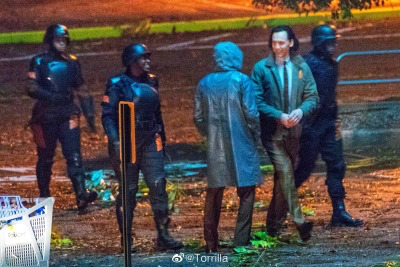
In all of the shots, the soldiers are somewhat scattered, rather than walking in tight formation around Loki.
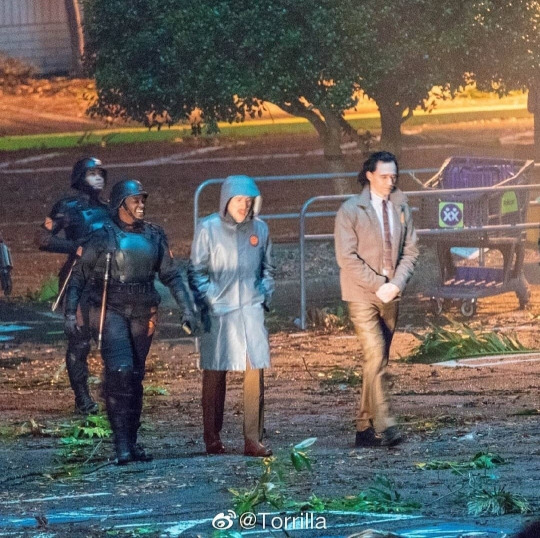
There appears to be a massive shopping cart in the background to the right of the group, along with one of those cart stalls you see outside the grocery store. By “massive,” I mean the cart appears to be at least six feet tall, unless the size is a trick of the camera’s telephoto lens.
Speculations:
This scene takes place on Earth, in the parking lot of a strip mall or big box store where shopping carts are used. (I’m going to assume the oversized shopping cart behind Loki in one of the photos is a trick of the camera lens.)
The scene takes place within the last 30 or so years of history—since those stalls for shopping carts in the parking lot weren’t invented until the ‘70s or ‘80s. (People used to walk their empty carts back into the store themselves.) Or the scene could take place in the next few decades ahead of us, before shopping carts and cart corrals become obsolete for some reason or another (like, robots do all the household shopping?).
I think some of these photos show the actual scene while it’s being filmed, but others do not. The shots in which the soldiers are laughing may be from a rehersal or other off-camera preparation. (I would not expect military troops to smile and laugh while they should be on alert.)

The soldiers surrounding Owen and Tom are TVA troops. (If you look closely at the ones in back of the group, you can see the beige TVA outfits under their body armor.)
Those funky wands the troopers are holding are their weapons. The wands could be electric shockers or ray guns, but I would expect something a little more unusual. Like, maybe they can use those wands to freeze time in a selected area or something like that.
Owen’s character appears to be a senior TVA official or authority of some kind. He is definitely with the TVA.
I speculate that Loki is voluntarily leading Owen’s character and the troopers to something hidden somewhere inside the mall/shopping center.
The troopers are not guarding Loki closely (as the SHIELD troops guarded him on the helicarrier in Avengers1). Their more relaxed formation seems to indicate they do not see Loki as a threat. They are probably primarily a protective escort for Owen’s character—not there to restrain Loki.
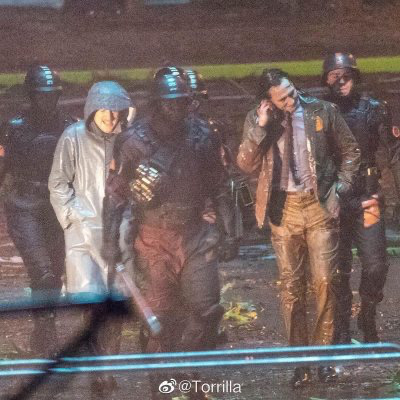
Since Tom is gripping his hands together in front of him in some of the shots, Loki may be wearing handcuffs. However, I’m guessing he’s not, because he has his hands in his pockets in other shots.
I think Loki is cooperating with the TVA, but he is not actually a TVA agent, as some have already suggested. For one thing, Loki is not a team player. He is an agent of chaos. He would revel in the disorder the TVA is trying to control. On top of that, Loki is a prince and a god. Can you imagine him working—for a boss—at some agency?
Knowing Loki, he is probably working with the TVA here because they have something he needs/wants, and vice-versa. Loki will not hesitate to turn on them if necessary.
I think the TVA have some sort of technology that prohibits Loki’s magic—otherwise they would not have been able to incarcerate him in the scene from the Disney+ Super Bowl ad. (That said, it’s always possible Loki was pretending to be captured for his own reasons—as in Avengers1.)
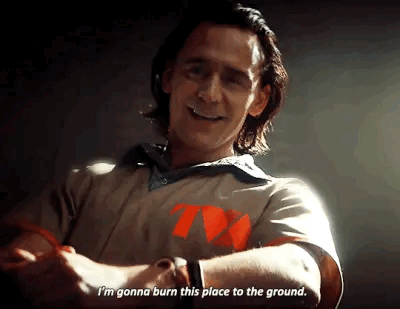
If the TVA is able to restrict Loki’s magic, that would explain why Loki is wearing those hideous beige clothes that appear to be standard-issue TVA gear—when we know he would prefer to wear a Gucci suit. If Loki had his powers I think he’d dress himself differently. In any case, Loki is incognito, masquerading in human clothing rather than wearing his Asgardian armor (except in one noteworthy photo, which I’ll come back to).
Maybe Loki’s threat of “burning the place to the ground” (from the Disney+ Super Bowl ad) was idle—he really was captured and powerless in the scene from that clip (and probably pissed about it). So, he had to find another way to get out of jail. Maybe he struck a bargain with the TVA to get them something they want or to show them something important.
What might the TVA want that they can’t get themselves? If they can go anywhere, at any time they want, nothing is inaccessible to them—as long as they know where it might exist at any point in time.
For example, if the TVA wants to stop a bomb from going off in a shopping mall, they could go back to anytime the bomber was making the bomb or setting it up. If they want to prevent an assassination on the President, they could capture the assassin at any point in his lifetime. The TVA would have extraordinary power over the universe.
Suppose what the TVA wants is the Tesseract. Remember, in Endgame, Loki took it out of it’s proper place in time/space, creating an alternate reality. The TVA—an organization that tries to control time anomalies—probably didn’t like this. Perhaps the existence of Loki’s timeline threatens the regular time-space continuum. Suppose the TVA needs to secure the Tesseract in order to end or eliminate Loki’s alternate timeline.
What if the TVA was chasing Loki and managed to capture him—but not the Tesseract? Maybe Loki stashed it...in a shopping mall, of all places. Maybe Loki convinced the TVA to let him go in exchange for bringing them to the Tesseract.
I would think that normally the TVA could just find a good place in the timeline to take the Tesseract from Loki—but none of this is occurring in the normal timeline. We’re in Loki’s timeline, which isn’t supposed to exist. Perhaps the TVA can’t travel or see forward in Loki’s timeline. This stands to reason because Loki’s timeline is uncharted territory. It should not be, so the normal rules of time and space don’t apply. (What a perfectly chaotic environment for the God of Mischief!)
It looks to me that the time travel in the Loki series will happen through the use of whatever technology the TVA uses—not through the Time Stone (Infinity Stone).
So, in this scene, Loki has to work with the TVA to win his freedom and get his powers back, while the TVA needs to work with Loki to get the Tesseract. But their interests probably sharply diverge from there. The TVA will probably be trying to eliminate Loki’s alternate timeline because they can’t control it. Meanwhile, Loki will be trying to keep it going because if the timeline ceases to exist, so does this version of Loki—unless he can escape into the regular timeline first. Thus, both parties will be struggling for power over the Tesseract while racing to stop or save the alternate timeline.
Finally, there’s this:

Confirmation of a Lady Loki! She is definitely wearing Loki’s Asgardian armor. I can’t wait to see how she fits into all of this! If she appears in this particular scene in the parking lot, which seems likely, I imagine Loki gets his powers back during the scene.
Or all of these ideas could be completely incorrect. Once again, these are just my wild speculations, based only on these new photos and my problematic knowledge base on MCU Loki.
I’m working through some further theories regarding time travel in Loki’s timeline, but they’re still simmering. I’ll share them if they wind up making any sense!
Special thanks to Torrilla for sharing these photos from the Loki series shoot!
*Note: Lelliefant’s speculations are sometimes uncannily correct but occasionally way, way off base. Lelliefant claims no responsibility for any lost bets or dsmaged otherwise incurred by Tumblr readers, stans, or mutuals resulting from adherence to the aforementioned speculations.
#spoiler alert!#Loki series#new footage#behind the scenes#loki#tom hiddleston#marvel#mcu#disney+#loki series#Owen Wilson#Loki series spoilers#wild speculation#via torrilla#hiddlestoners#loki’s army
87 notes
·
View notes
Text
Michael Sheen (old) interview
He’s played the prime minister and the messiah – now Michael Sheen is plumbing the psyche of the original man in black. Caroline McGinn asks him about the dark side.
It’s been a big year for Michael Sheen. A lifechanger, in fact. The 42-year-old actor is widely admired for his uncanny ability to play real-life characters: a Bambi-ish Tony Blair in a trilogy of films that included ‘The Queen’; David Frost for Peter Morgan’s play-turned-movie ‘Frost/Nixon’; and most recently, a demon-ridden Brian Clough in ‘The Damned United’. But no previous role has come close to the Christ-like leader Sheen played in ‘The Passion’ in his South Wales home town this Easter: an epic 72-hour piece of community theatre which ended in Sheen being crucified on a local roundabout.
‘The Passion’, a local take on the Gospel commissioned by the storming new National Theatre of Wales, was more than just a play. It was a collective story that Sheen probably couldn’t have told anywhere but in Port Talbot, a town divided by the roaring M4 and dominated by a giant steelworks that was once the largest employer in Wales; a place where churchgoing and storytelling are still alive. It’s also his parents’ home. Sheen was so moved that talking about it makes him choke up. ‘I did this seven-mile procession with the cross,’ he recalls, wiping his eyes with the back of his hand. ‘It was boiling hot. There were 12,000-15,000 people. And I was seeing these bare-chested tattooed blokes standing outside pubs with pints, with kids, with tears in their eyes going, “Go on, Michael, you can do it!” It’s quite rare to be in the middle of an experience knowing it is probably the most meaningful one I will ever have in my life. Something in me relaxed after that, I think. I could say, “If I died tomorrow, I did that.”’
Over a glass of red wine in the bar at the Young Vic, where he is about to play Hamlet, Sheen does seem completely relaxed: eager, open and very Welsh, with his squiggle of dark brown hair and his neat, expressive hands. He has a shapeshifter’s face: mobile, not memorable, too blurry and mercurial for a romantic lead. And it is a pleasure to hear his real voice: un-damned by Clough’s nasal, northern scorn or Blair’s prim inflections, it is a gloriously unstoppable lilting flow which seems, to my English ears, to come straight from the Valleys.
Sheen currently lives in LA to be close to his 12-year-old daughter with ex-partner Kate Beckinsale. He is an unlikely denizen of La La Land, with his bike helmet, his puppyish friendliness and his lack of pretensions. His spectacular return to his roots at Easter has, he says, redefined who he thinks he is, and what he wants to do with his work: something which he expresses in probably the longest sentence I’ve ever heard anyone deliver. ‘“The Passion” did for me what I hoped it could do for everyone in the town, potentially, which is to experience your life and your home in a different way, because I think there is a tendency – and I have it, and I notice other people have it too, probably everyone has it but certainly people who come from quite challenged areas – there’s a sense that your life is of no interest, that your story is mundane and there is no, for want of a better word, numinosity, no transcendence, and so to be able to tell a story about the biggest things there can probably be, a version of the “greatest story ever told” in the town that is seen to be the least likely town for that to happen in, then the people in that town, every time they go around that roundabout, which is many times, can go, “Not only is that where I get fish and chips, it’s also where the crucifixion happened,” and the everyday becomes transcendent – to something that is miraculous.’
Thanks to Sheen’s great-grandfather, street preaching runs in the family. But the starry-eyed idealism behind doing a passion play in Port Talbot, to reach thousands of people who would never set foot in a theatre, might easily have backfired. It was an unglamorous risk for a local bloke-turned-Hollywood big shot to take. You can’t imagine the area’s other famous filmmaking sons, ultra-cool customer Antony Hopkins or hard-living Richard Burton, pulling it off – though Burton did enjoy making a splash on the local beach with Liz Taylor and his private helicopter. ‘The Passion’ was supposed to shine a light on the miracle workers who do what Sheen calls the ‘unseemly’ work of care: for the old, the sick, the battered wives and the young offenders. For it to work, its makers had to gain the trust of the town.
‘After the Last Supper, when the Manics played, I was put on trial on the back of a truck and the crowd took over,’ he says. ‘It was at that moment I realised they understood it was their story. It was frightening and exhilarating. We didn’t know what was going to happen. Along the procession route people put photos of things they’d lost. Then, on the cross, I did a litany. Of things I remembered, or that I’d gathered from people, of people and places that don’t exist any more.’ It was Sheen’s epic personal connection to South Wales, where his dad once worked as a Jack Nicholson impersonator, and where his great-grandfather got rich when God told him to buy a tin mine. Sheen’s codirector Bill Mitchell and writer Owen Sheers spent a year getting stories from locals, and fed them into the piece. ‘I was just a participant: we all were,’ he says. ‘My mum and dad said a woman came to their house and told them I’d called her mother’s name when I was on the cross, and it had changed something for her. The need that drama first came from was community, witness, celebration and catharsis. We were trying to find a way for that to happen on a large scale.’
The Port Talbot ‘Passion’ has already gone down in theatre history. So where do you go after scaling the twin messianic peaks of Blair and Christ? Down into the doubt-ridden depths of Hamlet, naturally, the biggest role that a young (or young-ish in this case) actor can play. Judging by Sheen’s wordflow, those famous soliloquies won’t be a problem. After all, the actor made his name on stage: he won his first professional role at the Globe opposite Vanessa Redgrave in 1991 before he had graduated from Rada.
His CV is full of monster roles: Caligula, Peer Gynt, Amadeus (playing Mozart was his break into Broadway in 1999). Clough, and even Blair and Frost, creep into that list – though he’s obviously bored of talking about the factional film roles that made him famous: ‘I’ve done relatively few characters based on real people,’ he protests, just a little bit too much. ‘I’ve been working on stage now for more years than I care to mention.’
‘Project Hamlet’ has been on the cards for a while, but Sheen was waiting ‘for the right director and the right theatre’. Unlike recent celebrity Hamlets David Tennant and Jude Law, he didn’t want to do conventional West End Shakespeare, hence the Young Vic, with its younger, mixed audience and its imaginative approach, which includes – mysteriously – reconfiguring the playing space so that ‘Hamlet’ audiences must arrive 30 minutes early to take a ‘different route’ in. Sheen’s director of choice is Ian Rickson, the ex-Royal Court boss who has helped actors achieve career-defining roles (Kristin Scott-Thomas in ‘The Seagull’; Mark Rylance in ‘Jerusalem’). Hamlet tends to demand something very personal from actors: one reason why so many of them crack up over it, though Sheen seems remarkably unfurrowed by the prospect. ‘It is,’ he says, ‘good not to have to worry about people saying, “He doesn’t sound like Hamlet.” It’s me: I’m not doing a voice or playing a character, so to speak. It’ll sound like me and look like me, a bit of Welsh mixed with a bit of posh.’
Sheen sees ‘Hamlet’ as ‘like a portal. Or a living organism in some way. Other Shakespeare plays don’t have that quality of seeming to change. “Hamlet” works on you and sucks up everything you have. It’s a bit like looking into the abyss. What “Hamlet” makes everyone confront are all the things that are most frightening: irrationality, betrayal, madness and abandonment. It is very, very dark, and it dances along through that darkness.’
Sheen’s prince promises to be darker than most. Not just a mad Hamlet, but maybe even a bad Hamlet. ‘Me and Ian have taken a completely different approach,’ he explains. ‘The most interesting way to approach it is not to trust anything that Hamlet says, to assume that he’s an unreliable narrator. And once you do that, you realise how many assumptions there are about the play.’ Sheen cites Philip K Dick, David Lynch and Edgar Allan Poe as influences. The production will be set in a world ‘that feels as if we’re in some sort of institution’. Madness will be the keynote: ‘I discovered when working on it,’ says Sheen, ‘that it’s the first time anyone used the phrase “the mind’s eye”.’ Horatio says, “A mote it is, to trouble the mind’s eye.” Meaning a piece of grit. It sums up what I think the play is. It’s a bit of grit in the mind’s eye of the Western world. We’ve tried to expel it, by smoothing out its inconsistencies and by stopping it from being irritating. That’s a way to neutralise it and make it safer. But actually it’s the most dangerous of plays.’
Rickson and Sheen have found unorthodox inspiration in anti-psychiatrist RD Laing and G Wilson Knight, the twentieth century scholar who wrote an off-beam but brilliant essay on Hamlet, the ‘ambassador of death’ in the land of the living. ‘Laing said that if you take mad people on their own terms then maybe they’re just talking in a sort of heightened language about their lived experience,’ says Sheen. ‘And our take on “Hamlet” definitely questions the boundaries of what you would consider madness to be.’
So where do you go as an actor, after the heights of being crucified, and the depths of Hamlet’s psyche? ‘The answer to that is that I just don’t know,’ says Sheen. There are a couple of projects: Sheen says he was ‘roped in’ on a set visit to a new untitled film by cinema’s man of mystery, Terrence Malick, starring Sheen’s girlfriend and ‘Midnight in Paris’ co-star Rachel McAdams. And there’s also Wales-set thriller ‘Resistance’, out this month. But he has his heart set on directing a film about Edgar Allan Poe. ‘He was an extraordinary character. Very dark.’ The legacy of this life-changing year is a sharper, stronger passion for a live Welsh tradition: storytelling. ‘I just don’t know where you go after “The Passion” and “Hamlet”,’ says Sheen ‘But I do know that I want to tell stories that are powerful, that can reach people and equate to Greek theatre now. People still do need that. They respond to it. But you have to take risks to find them.’
(x)
17 notes
·
View notes
Text
Rebellious Stirrings
Category: Fanfiction - Homestuck Characters: Alpha Bro Strider (Alpha Dave); Alpha Mom Lalonde (Alpha Rose); Grandma English (Alpha Jade) Rating: T Warnings: N/A Originally written: 26 January 2018
Notes: Set in the early 2000s, probably. Rose and Dave are in their 20s. Rose is a single lady who likes to pursue guys who have zero romantic interest in her, apparently...
Another event. Another chaotic mass of swirling ballgowns and overdressed women fussing over their hair and make up, with men strutting about like peacocks with their tails fanned.
Rose Lalonde stood amongst it all, smiling thinly as a courtesy as she sipped a vodka martini, barely listening to the screenwriter who had sought her out of the crowd for what was apparently going to be a one-sided conversation about how the feminist movement was putting perfectly capable screenwriters like himself out of work in favour of some half-polished, female-focused plotline developed by one of the "insane" feminists that were apparently flooding the scene.
"I tell ya, Rose, women should stick to writing books. It's what y'all best at - leave the screen to the guys."
Rose continued to smile thinly at the man, though her gaze had turned deadly cold. Anyone who knew her well knew not to start complaining about feminism around her, but clearly this buffoon missed the memo on that topic.
She had already opened her mouth to respond when a much older woman suddenly seemed to appear from nowhere. Large round glasses reflected the light cast by chandelier yet still not enough to hide her unnaturally vibrant green eyes. She grinned toothily, throwing her arms around Rose's shoulders.
"Rose! I'm so glad to see you, dear! How have you been? Is the new novel coming along well? Oh, you absolutely MUST come and meet my friend, he'll be so delighted you're here! Excuse us,"
Quickly linking her arm in Rose's, and almost spilling some of her drink in the process, Jade English offered a brusque apology to the screenwriter before pulling Rose away, a pathway seeming to open through the crowd for the pair. Rose, cursing at missing such a golden opportunity to put a repeat offender in his place, allowed herself to be dragged along.
"Not that I'm not happy to see you, Ms English, but your timing is impeccable as ever. That one in particular is constantly complaining about the rise of women in media, and I don't know how many more of these oh-so-illustrious social events I can continue attending without expressing my true feelings."
"Never mind about that," English waved a hand flippantly, "He won't be attending any more of these; you're not the first person to raise a complaint. Besides, causing a scene with him will have caused irreparable damage to an alliance that needs to be damage-free. Rose, this is Dave Strider,"
English had dragged her to stand before a male in a plain black suit, with blonde hair styled neatly. As he turned to them, she realised he was wearing a pair of aviator shades, and almost snorted to herself. What was up with this guy? Did he really think so highly of himself that he would seriously wear shades not only indoors, but also at night?
That stoic expression. That relaxed stance. He was, in fact, more underdressed for this event than herself - she in a short-sleeved blouse and skirt, he in a simple three-piece one might wear to work for a business meeting, and the pair of them surrounded by ballgowns and tuxedos. It was only as she processed this thought that Rose realised he wasn't trying to be fashionable or pretentious - he was comfortable with being himself, didn't buy into all of the consumerism and arrogance of the social elite.
"Miss Lalonde," he remarked, smiling ever so slightly as he caught her hand and briefly pressed his lips to the back of it in a gesture that may as well have been forgotten in the modern age. Rose wasn't entirely swept off her feet, but she was impressed with the man's apparent chivalry, turning his back on the conversation with some other male to devote his full attention to the two women before him.
"Jade has told me enough about you that I don't even need to read your biography," he remarked, giving a small smirk to English before turning his attention back to Rose. "She's also told me that you don't like certain baked goods."
Ah. So this was how they knew each other. Briefly, Rose wondered if this was Jade's attempt at matchmaking - after all, they appeared to be the only two people in the room who didn't care about the illustrious event they were attending. And, she couldn't deny, he was strikingly handsome with a figure that appeared to boast some years of hard physical effort hidden beneath that suit (the part of her mind already feeling the effects of the alcohol wondered if he truly was as sculpted as she perceived), and his neatly-styled hair and tailored suit indicated he was aware of fashion trends enough to know what was always stylish.
They spoke for a while, first about her books - she hadn't anticipated anyone at a film festival gala to be so interested in the written arts beyond screenplay, but he had persisted with questions. Then they had discussed his interest in filmmaking; he had begun as a camera operator, worked his way into the production team for a few relatively major films - she noticed that he couldn't resist name-dropping the leading ladies he had worked with, but it seemed to be an unconscious habit more than an attempt to cause her jealousy. Now, he was working relentlessly to develop the comics he had drawn as a teenager into a film or two.
It was somewhere around Rose's fifth (or was it sixth?) vodka martini that they tentatively approached the topic of the Batterwitch. Rose was more than happy, given her state, to describe the various jabs at CrockerCorp's Empress, and Dave quickly explained several of the references he intended to leave within his film. Maybe the people would wake up, though given how eager they were to conform, it was doubtful.
Somewhere around Rose's tenth or twelfth drink was when her motor skills became so impaired that Dave insisted on driving her back to her hotel - not only providing her a safe escape from total social humiliation, but also providing himself with an excuse to leave the event. He didn't drink, and had driven himself there, so it was a simple case of the valet bringing the car around and Dave trying to quiz the name of her hotel from her.
Of course, Rose was having none of that. Mainly because she was on the verge of passing out into an alcohol-fuelled coma and the idea of waking up curled next to a toilet bowl once more was not appealing to her in the slightest.
They ended up at the apartment Dave was renting, devouring pizza while (ironically, Dave insisted) watching some godawful romantic comedy featuring Owen Wilson and Vince Vaughn, Rose curled up next to Dave on the couch with a bottle of water. She flirted at him tentatively, to test the waters during the breaks, or when they changed to another movie, but he didn't seem to even realise.
Maybe Jade had the right idea with this guy. He seemed like a gentleman, and absolutely disinterested in her romantically, as had all the other males she had ever pursued. Sometimes she wondered if her pursuit of difficult bachelors was indicative of some sort of disorder, but she was pulling blanks every time she tried to think of which mental disorder could manifest those types of symptoms.
To his credit, he barely even moved when she shifted closer, and she didn't even catch a hint of a blink when she lay her head on his shoulder, or when she shifted so that she was almost hugging him, putting his arm around her shoulders almost as if the action was subconscious. She wondered how many girls he had been with, less curiosity as the second wave of inebriation hit, and more out of concern for just how difficult it would be to impress him. Well, she was no movie starlet for sure, but she was comfortable enough in her own form to feel confident.
They were onto Cleopatra when she shifted, sitting up properly as the remnants of the alcohol took over her tired mind, playing on the hormones that she usually refused to acknowledge. The hand that had obediently remained in her lap now rose up, tracing a muscular abdomen shielded from her touch only by a thin layer of cotton, twisting his tie around her hand as she shifted to sit up, as he turned his shade-covered gaze on her.
"Rose, what are you doing?"
Still holding his tie, she reached up with her other hand, pulling his shades away. He half-heartedly tried to pull back, but it had no effect and she gently set the shades on the back of the couch, fingers returning to trace his jawline.
"Kiss me, Dave,"
"Wha--? NO!"
She tugged on his tie, pulling him closer, but he raised a hand just in time, covering her mouth before she forced them together. Startled by this, Rose let go of the tie and he reeled back, stumbling away from the couch as she fell back. At least she had broken that stiff, uncaring facade.
"What the hell is wrong with you?" he demanded, taking another step back, "There were over a hundred other dudes at that gala and out of all of them, you tried-- ugh, I can't even put it into words!"
"Fine, I'm sorry for being attracted to you," Rose rolled her eyes, not bothering to sit up, "Next time, I'll do my best to control my raging feminine hormones. After all, a woman who goes for what she likes is not what we want in our perfect, patriarchal society, is it?"
Oh god, now the politics. Sober Rose had apparently been locked away for the night, and now she was at the mercy of her drunk self.
"What? No, that's not what this is!" Dave cried, "You can't be attracted to me, either. That's more messed up than the healthcare system. Jesus, Rose, get a hold of yourself!"
"What, it's messed up for a single woman to be attracted to an apparently single man? Do you know how--"
"You're my goddamned sister! That's why it's messed up!"
Rose stopped as his words hit her, sinking in so fast they flushed away whatever alcohol was left in her system and bringing her to a sobering reality. Slowly, she sat up on the couch and looked up at Dave, mouth hanging slightly open. The revelation was so shocking to her, yet made so much sense. Jade had never even remotely attempted to match Rose up with anyone, had only ever introduced her to other Batterwitch protestors so that they could further their rebellion. How could she have even thought, even for a second...
Something in her expression must have shown, because Dave visibly relaxed, exhaling as he pinched the bridge of his nose.
"Jade never told you, did she?"
Rose shook her head. She was his sister. They'd even discussed their rare genetic deformity, the eye colours. And she had been too wrapped up in hormones to realise what it all meant. She had mistaken his interest as attraction, his concern as indication of romantic feelings.
Dave sat on the couch beside her, looking like he had just been told off for some childish prank.
"How much do you know about a game called SBURB?" he asked. Rose sighed heavily.
"Not all that much. It invites the apocalypse to the homeworld of anyone who plays it, apparently."
"Not exactly," Dave replied, "The apocalypse will happen, sure. And the game directly links to that. But it doesn't cause the apocalypse itself - the apocalypse was already happening. The game gives a few people a chance of survival..."
4 notes
·
View notes